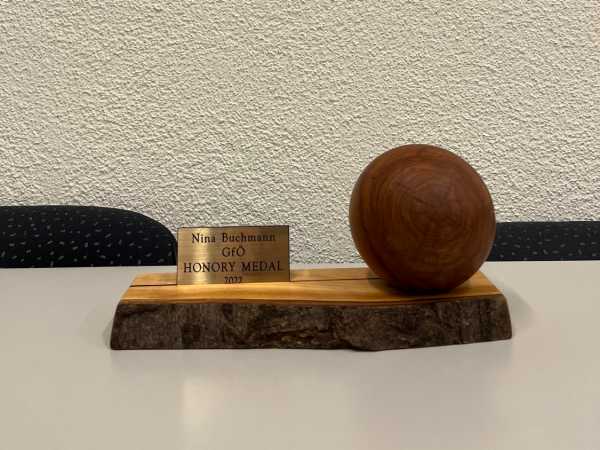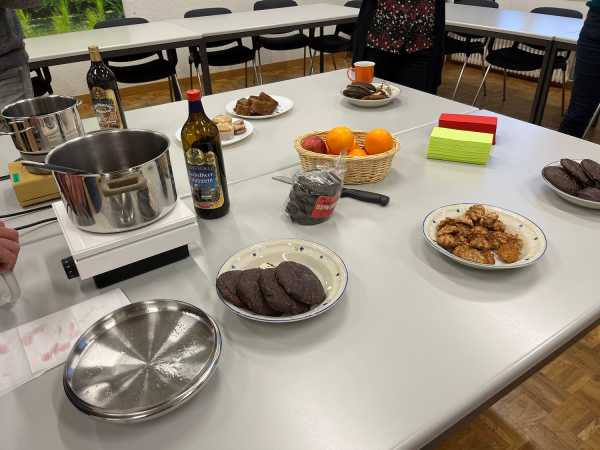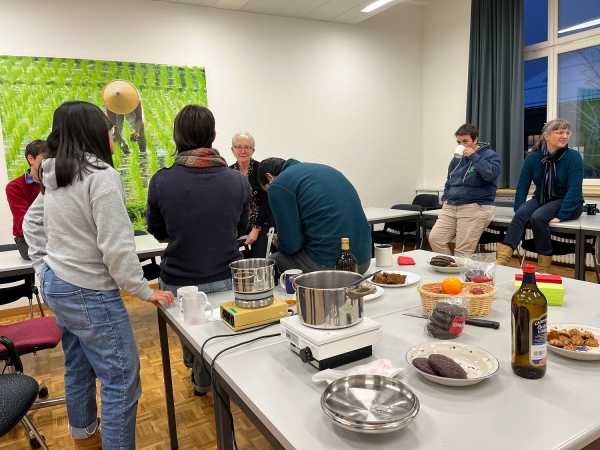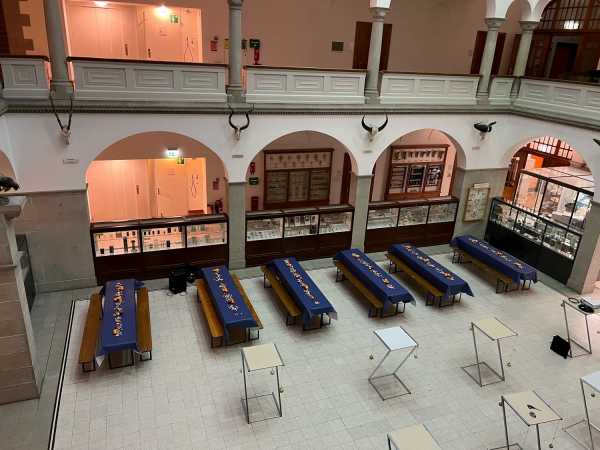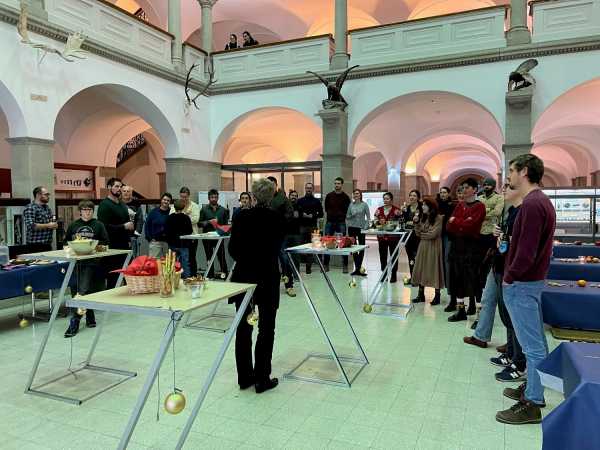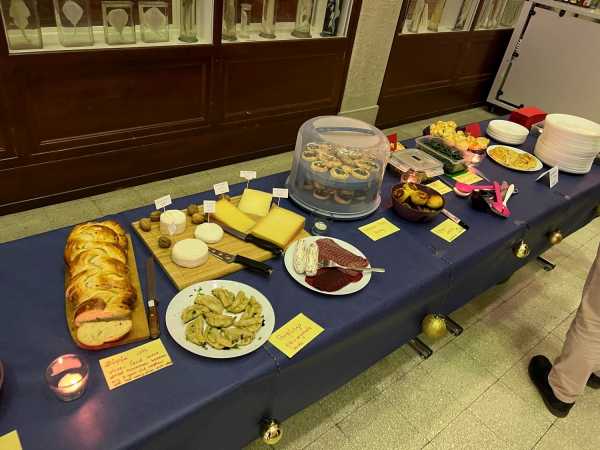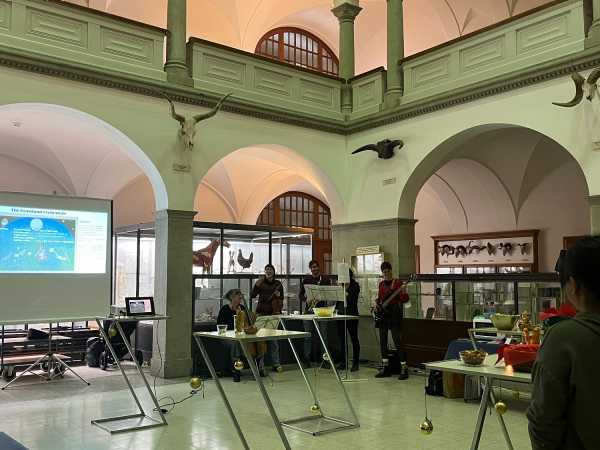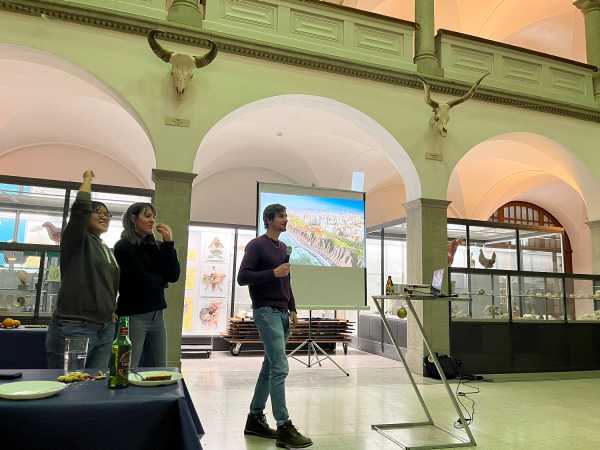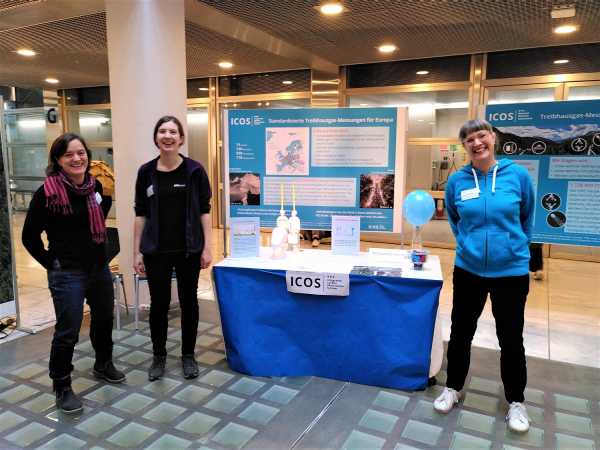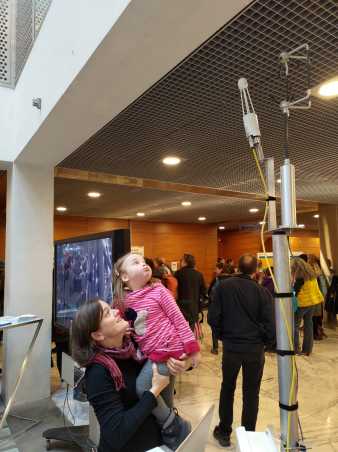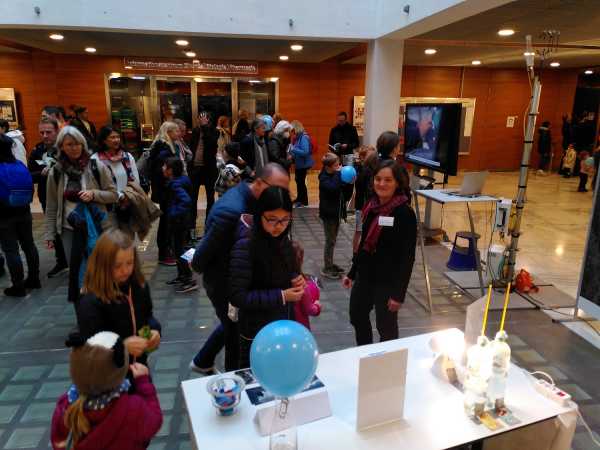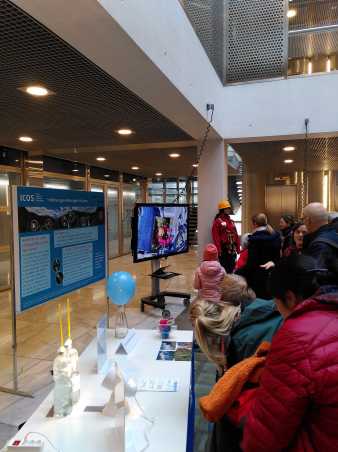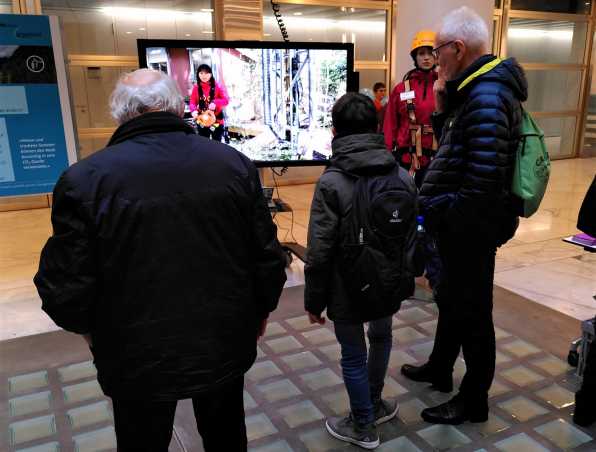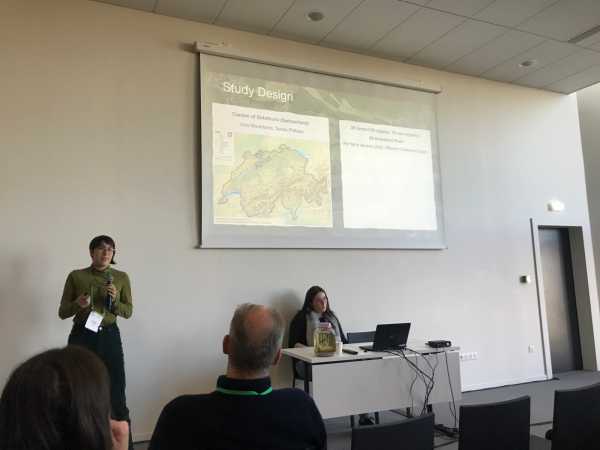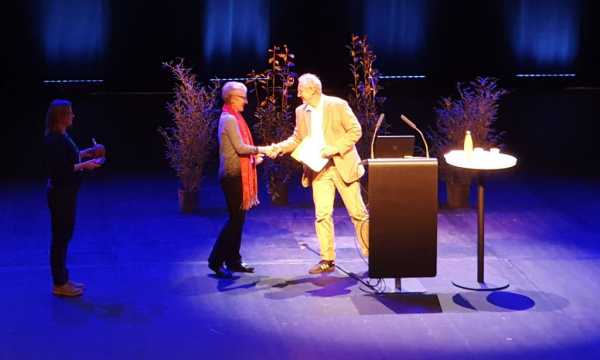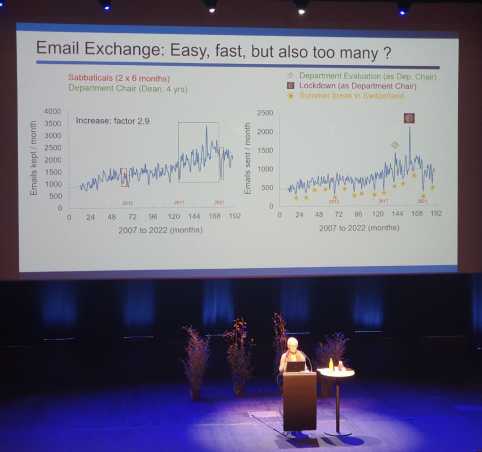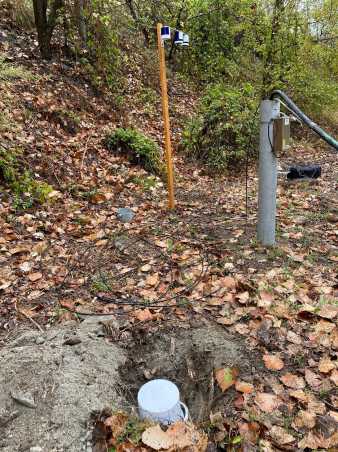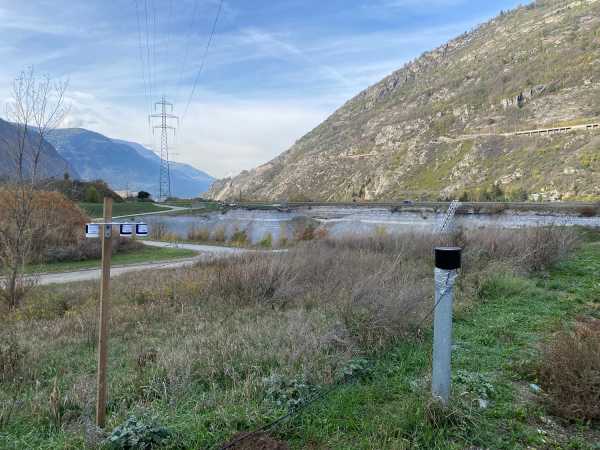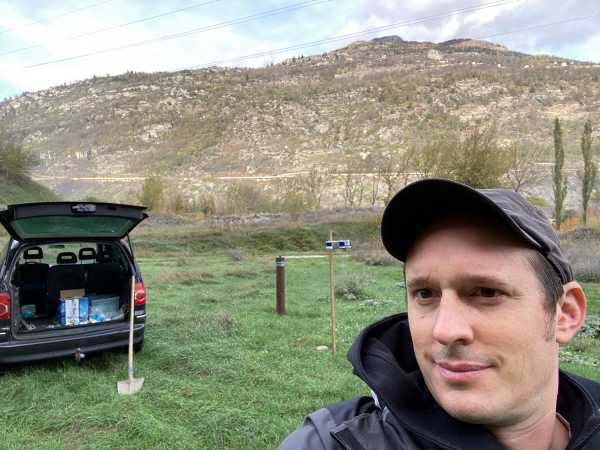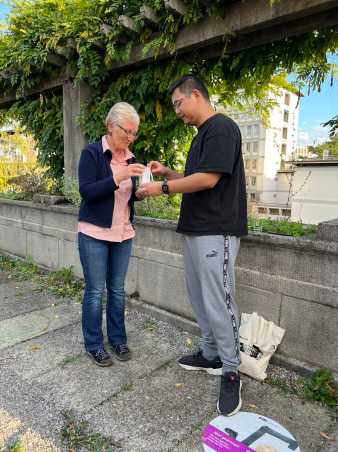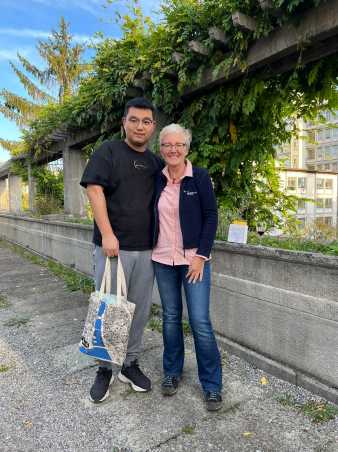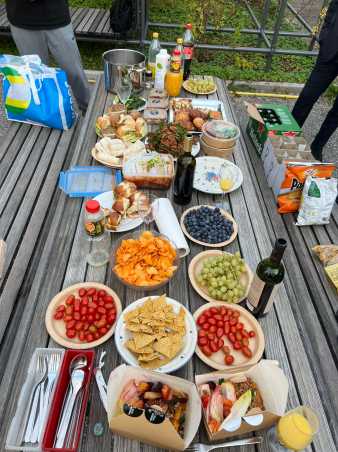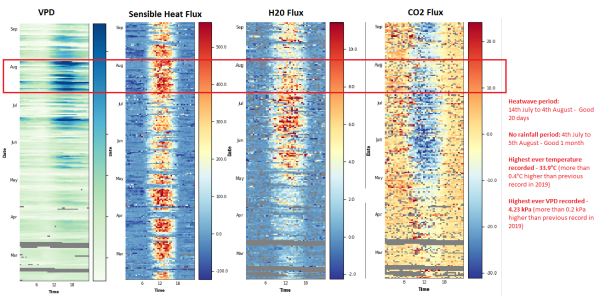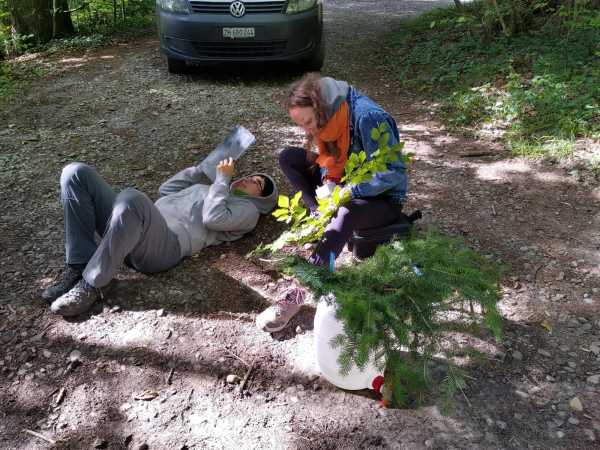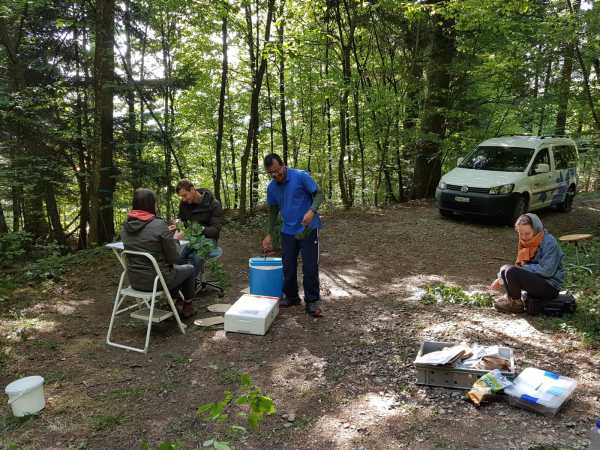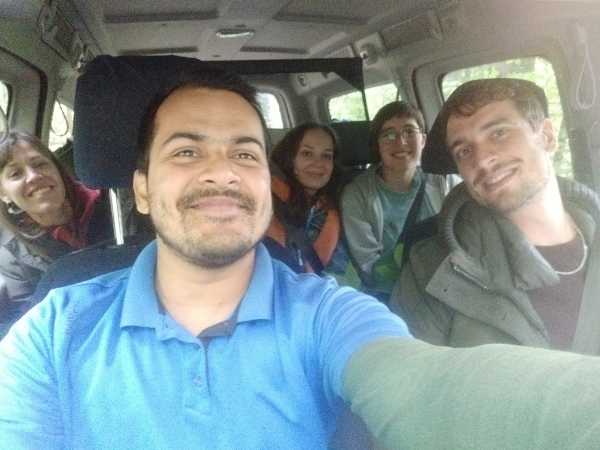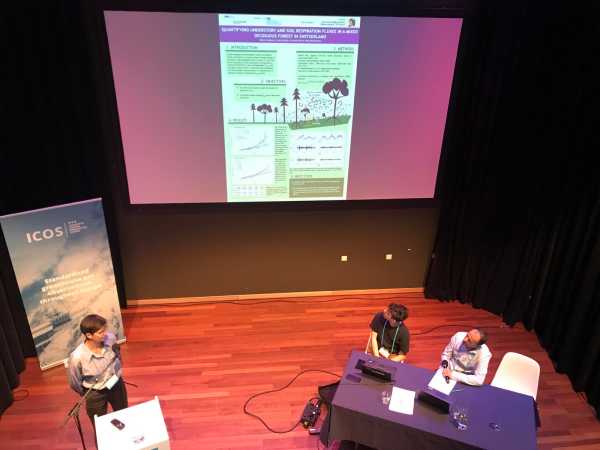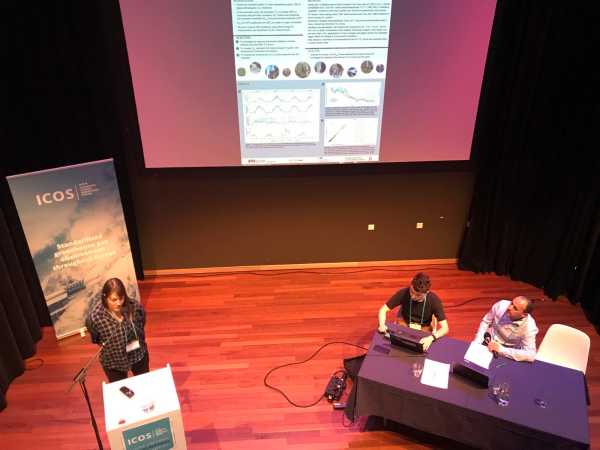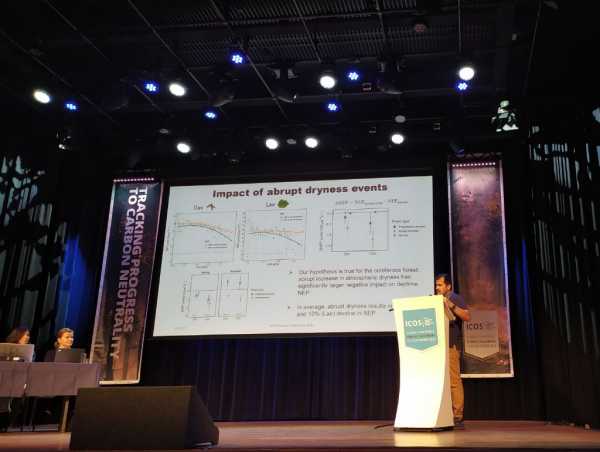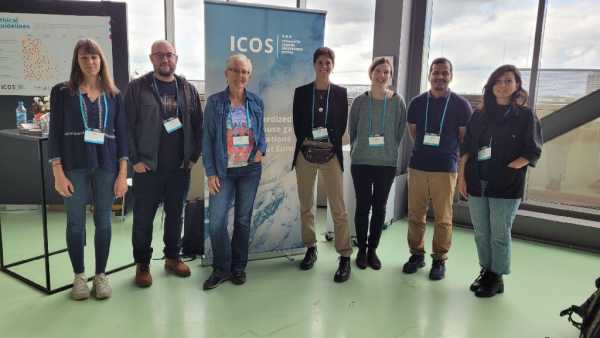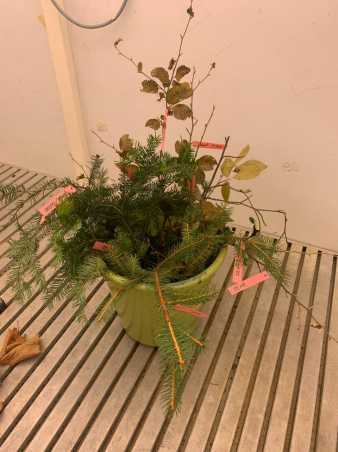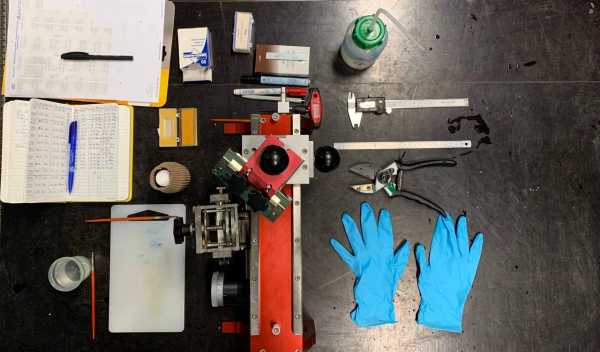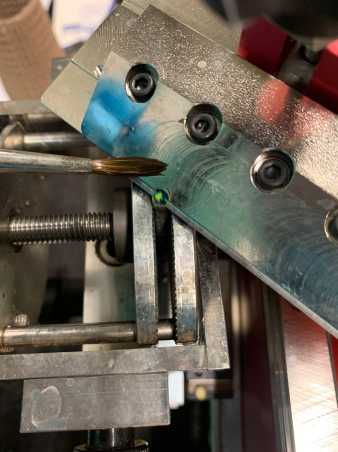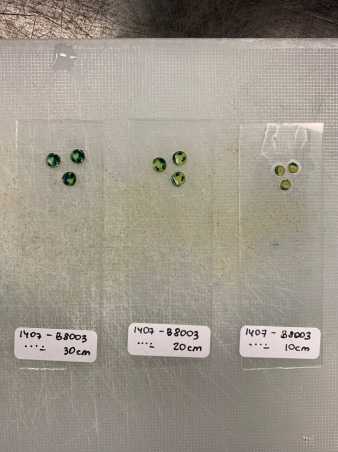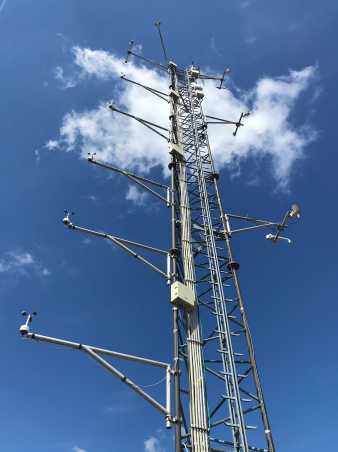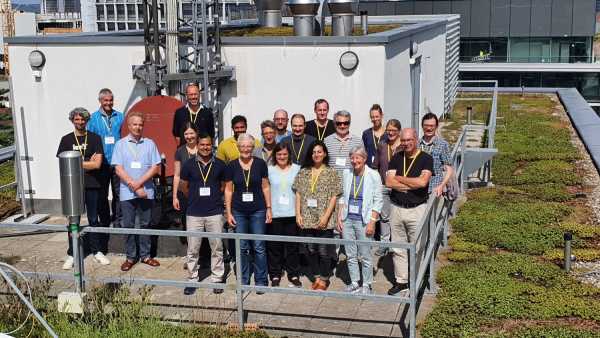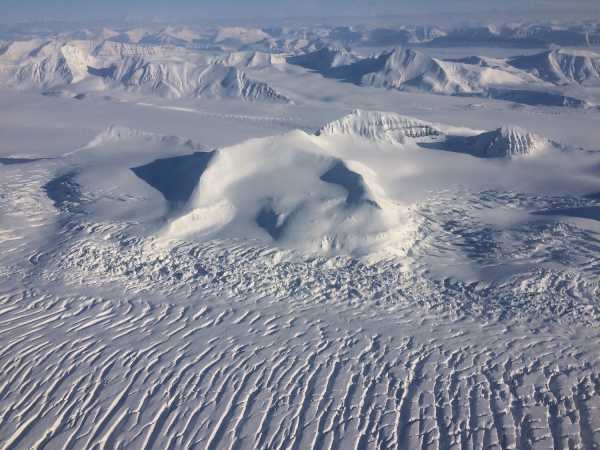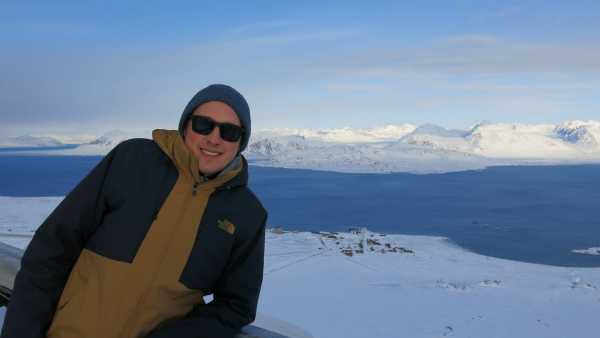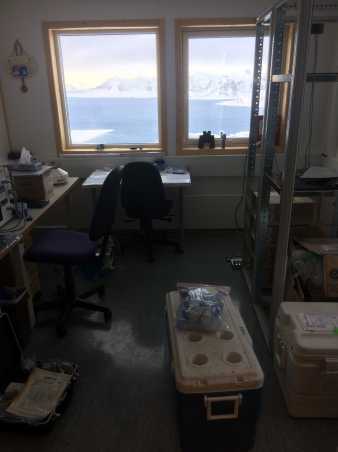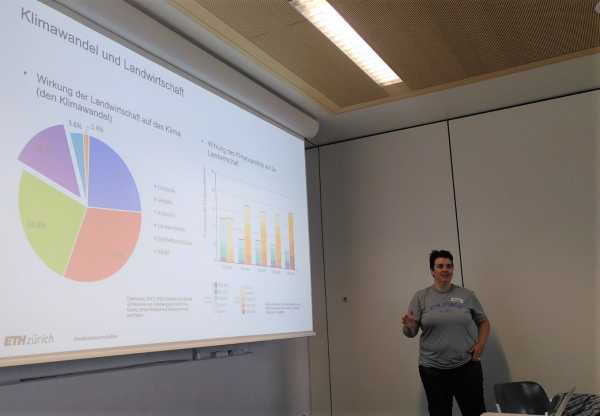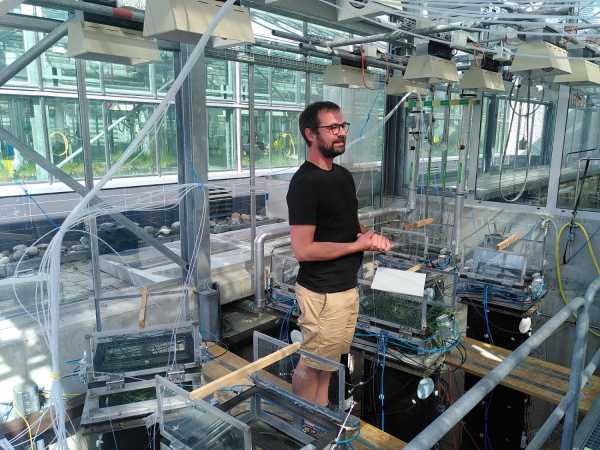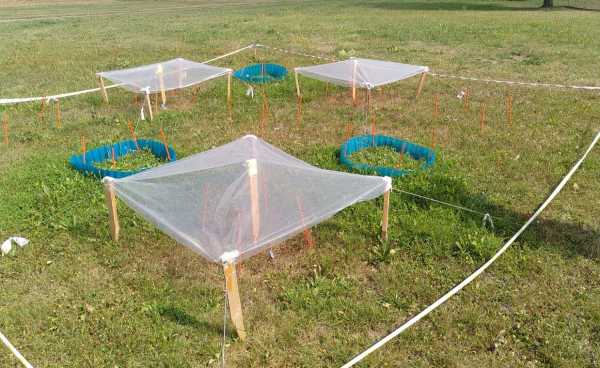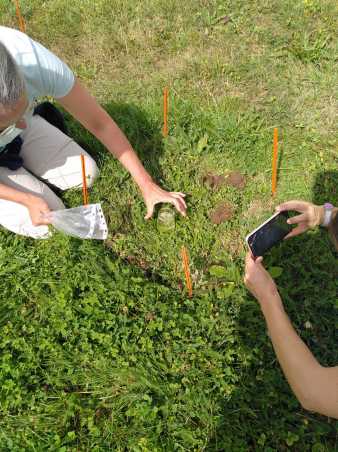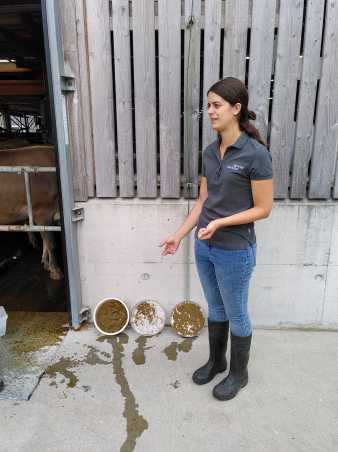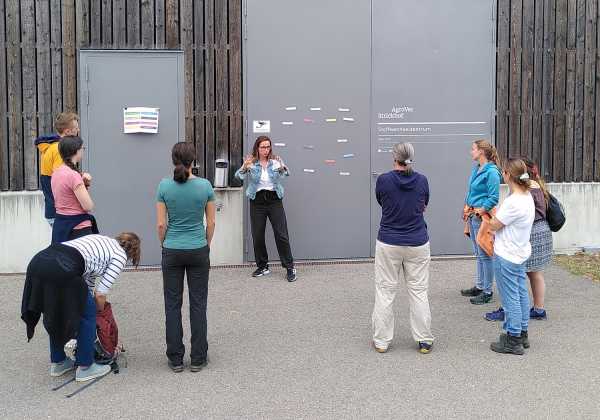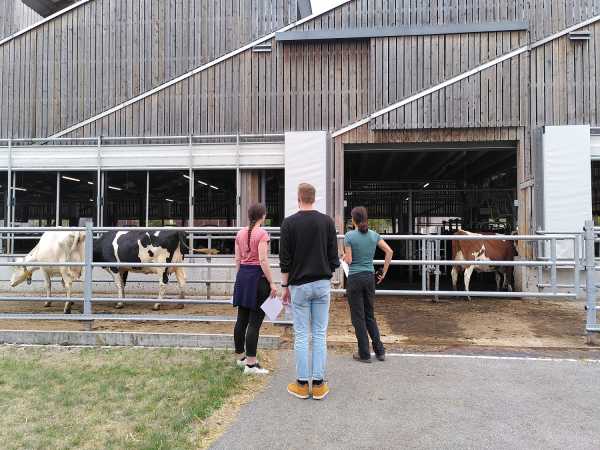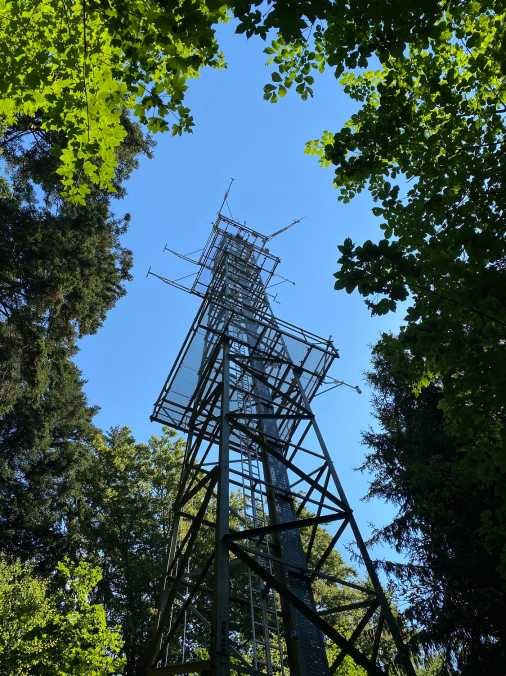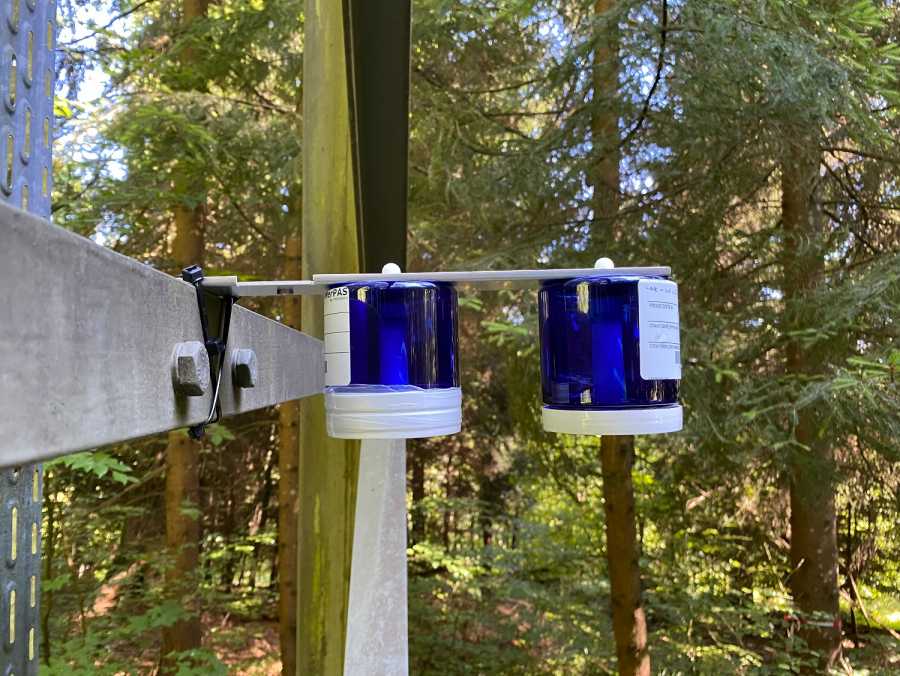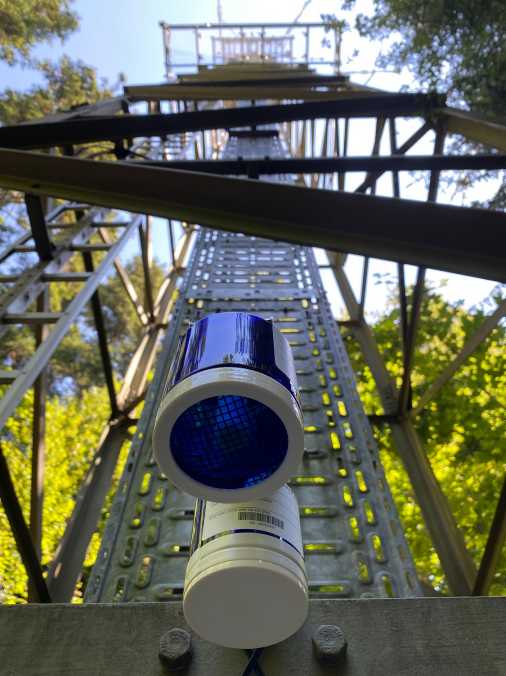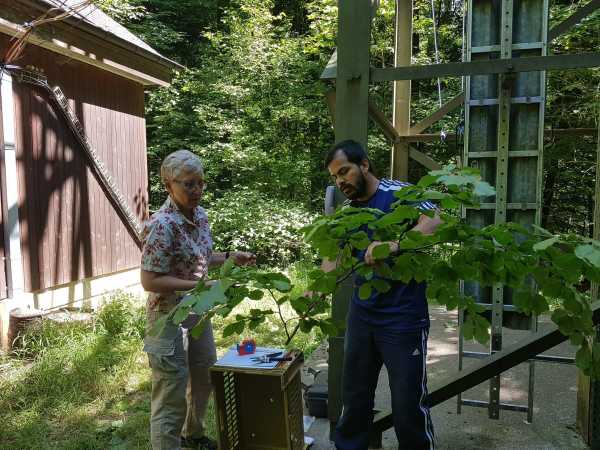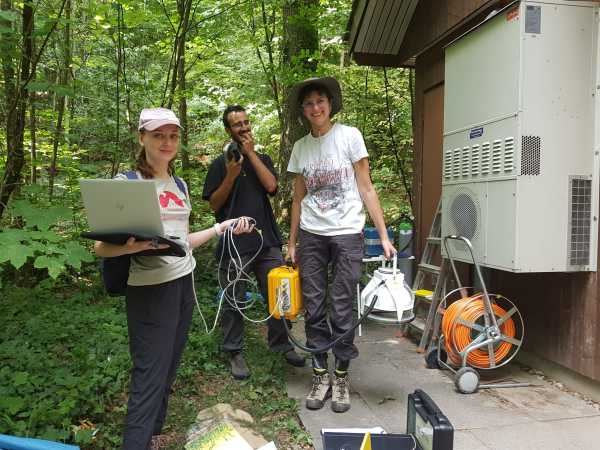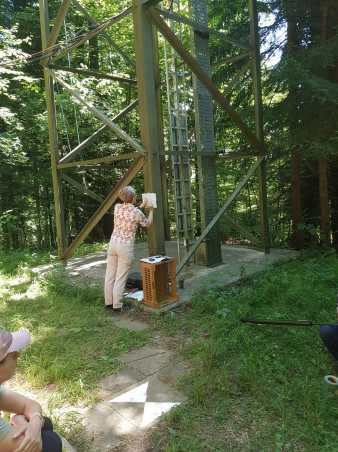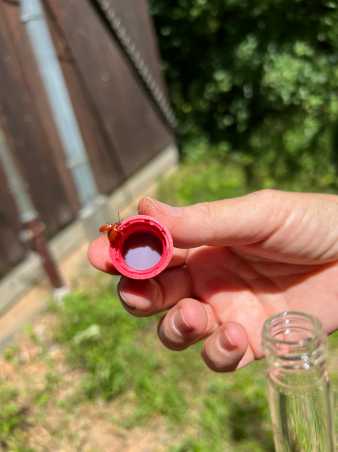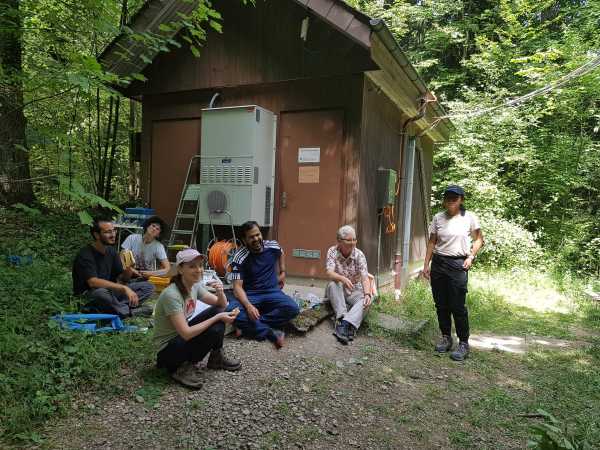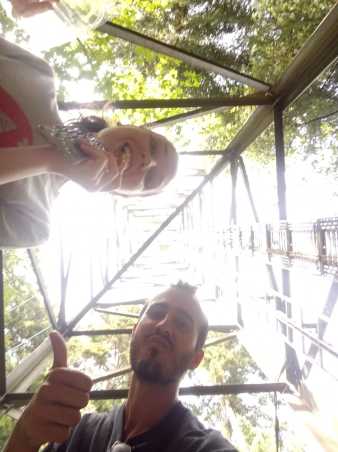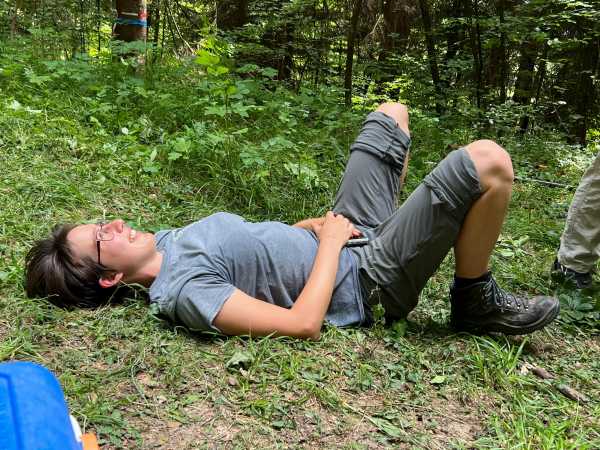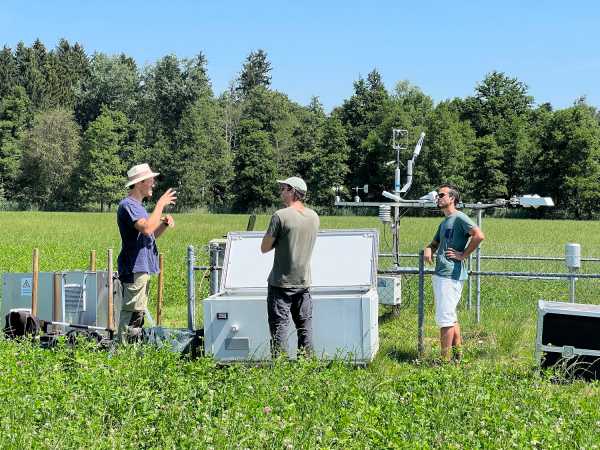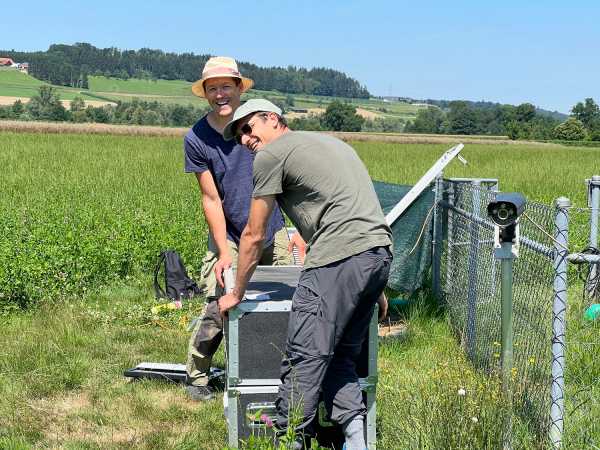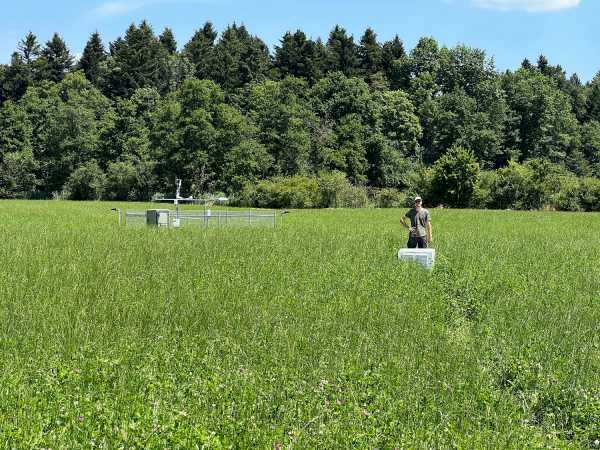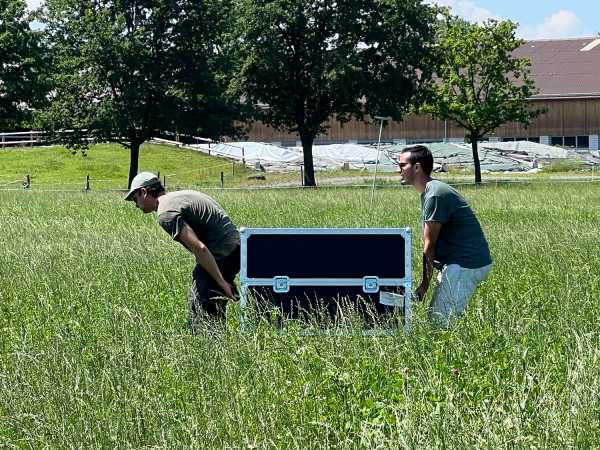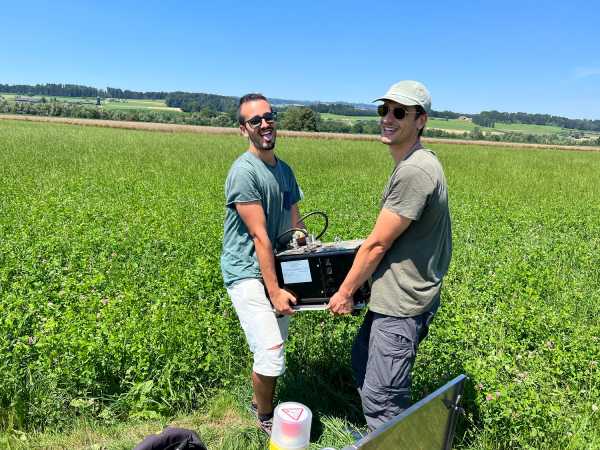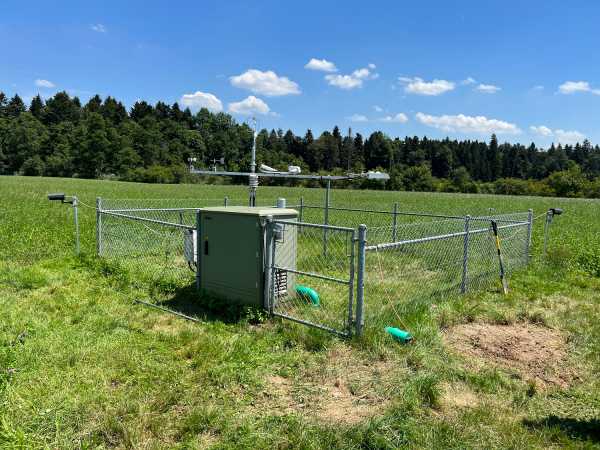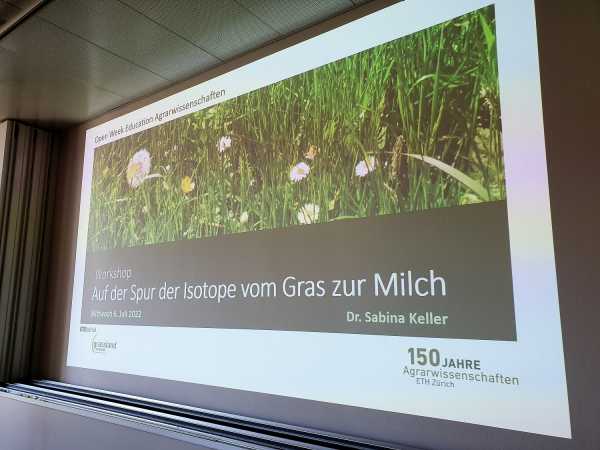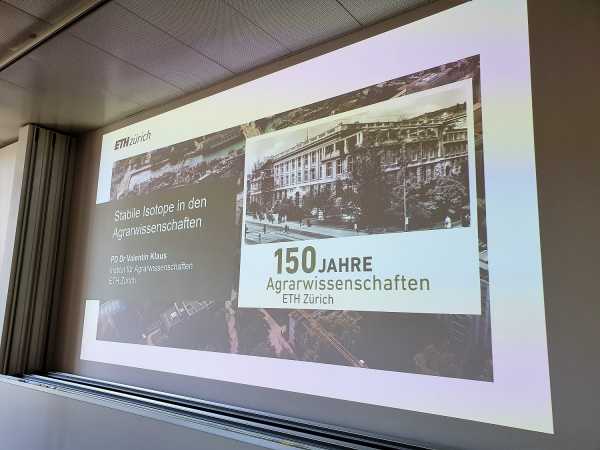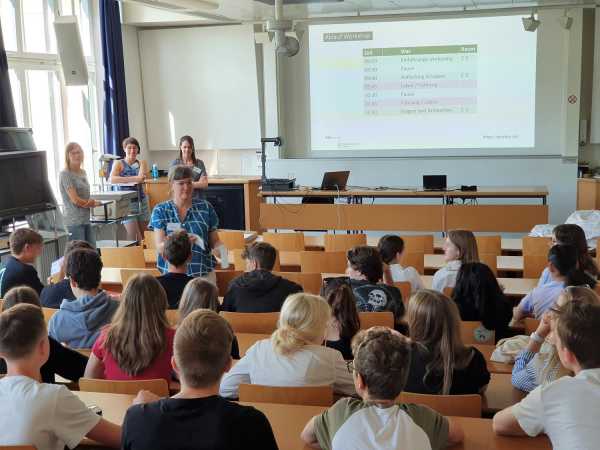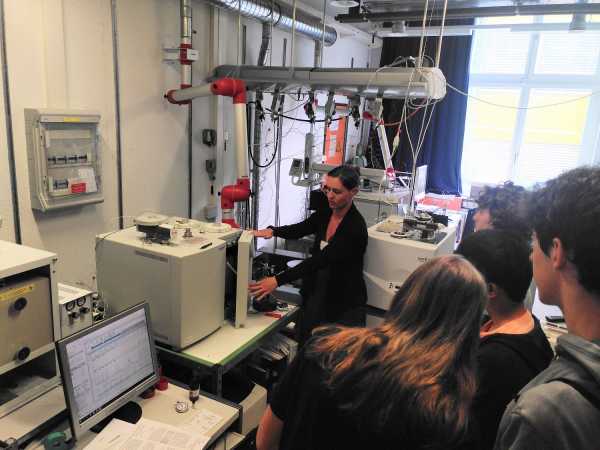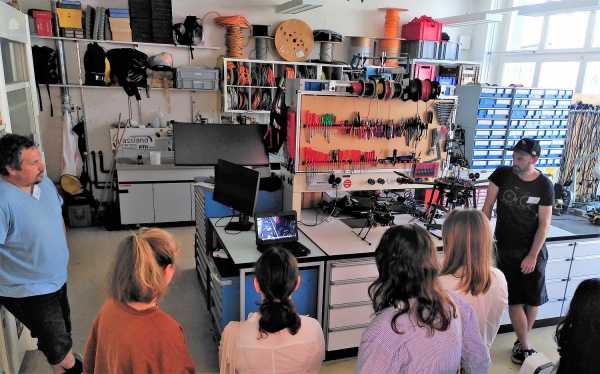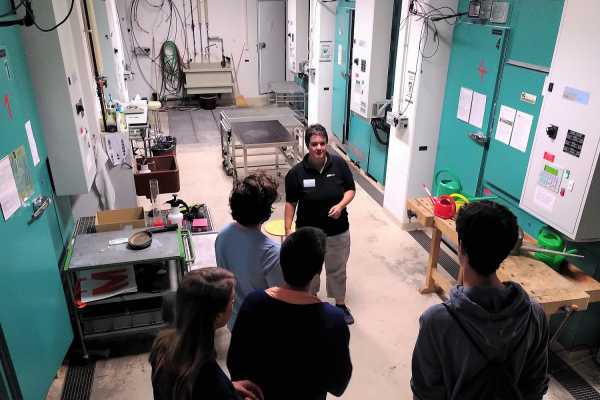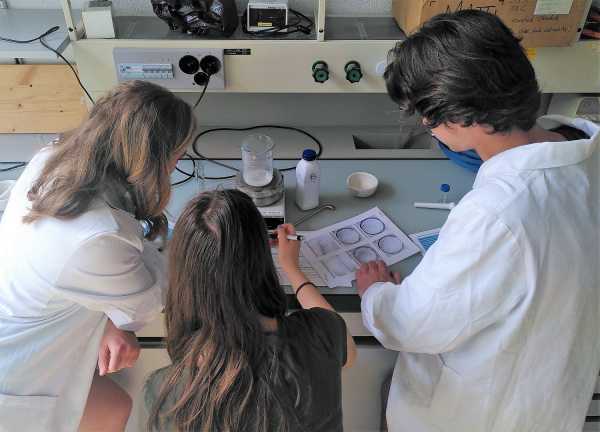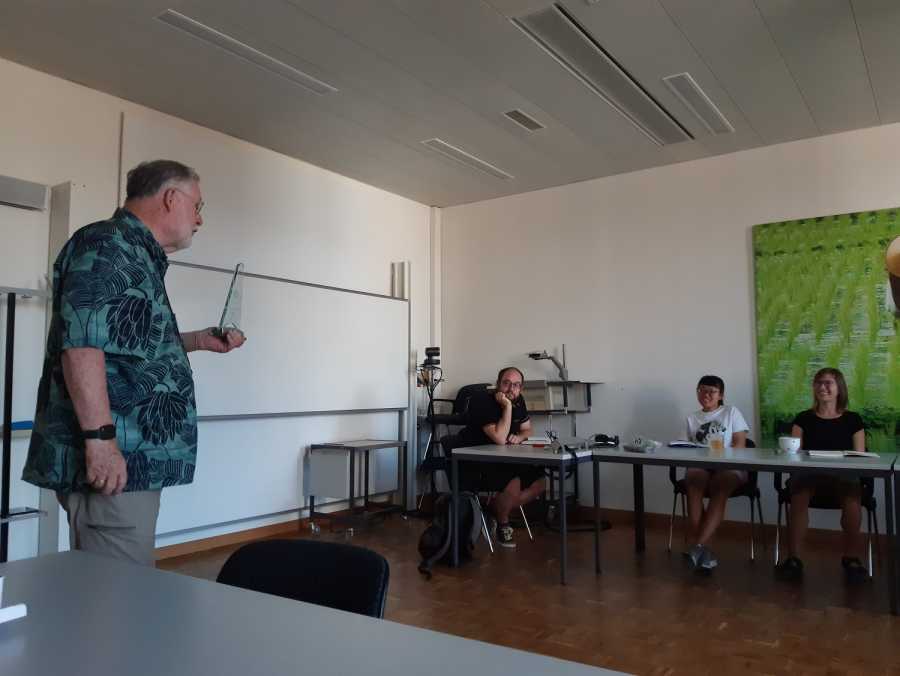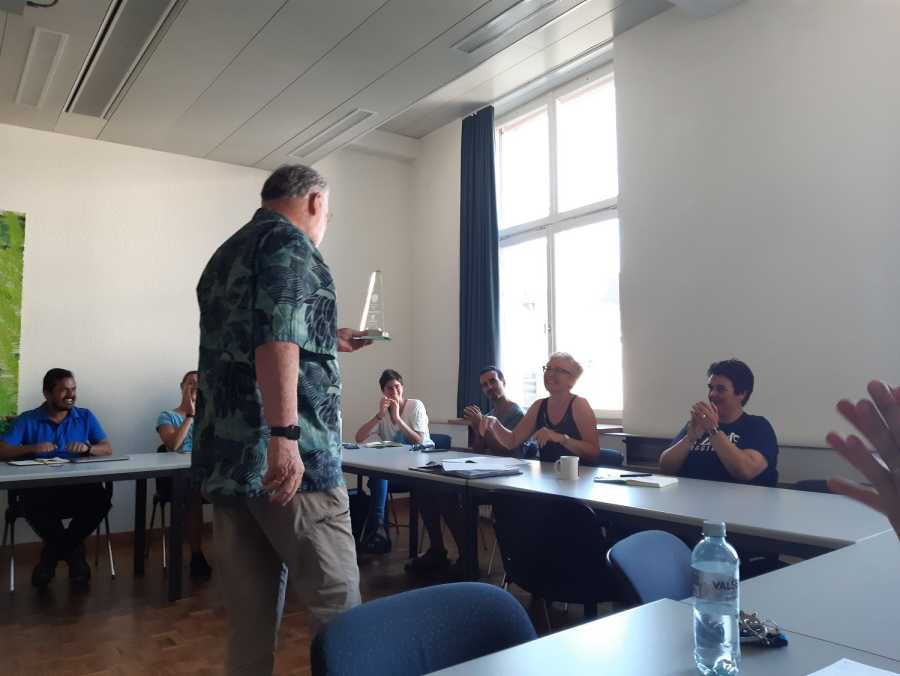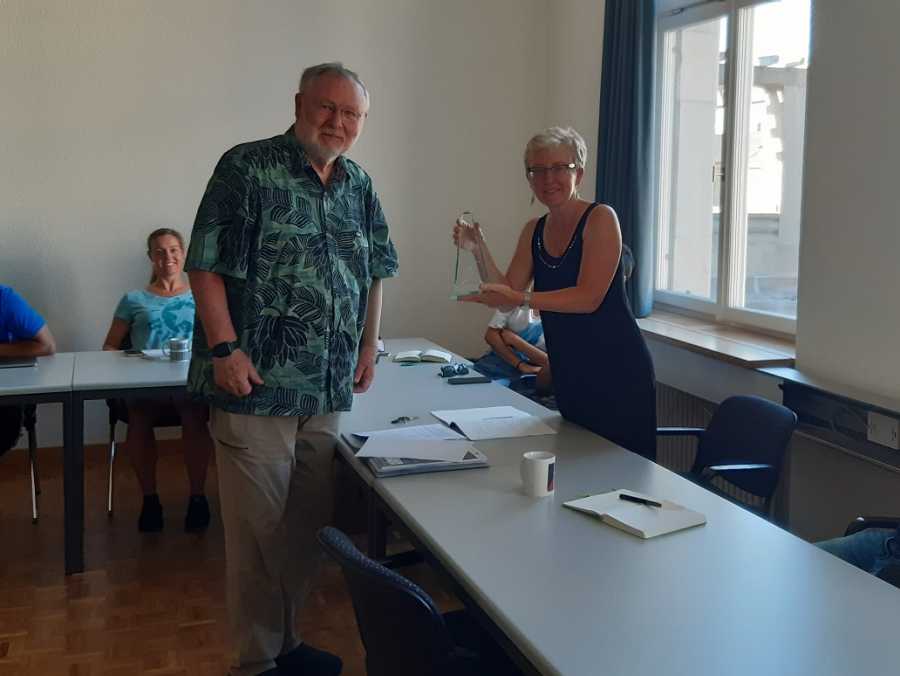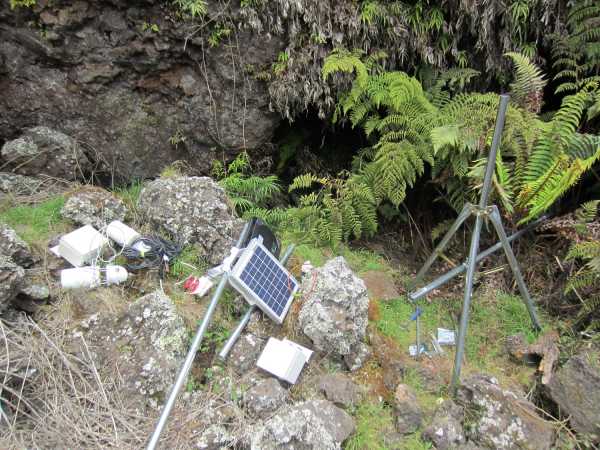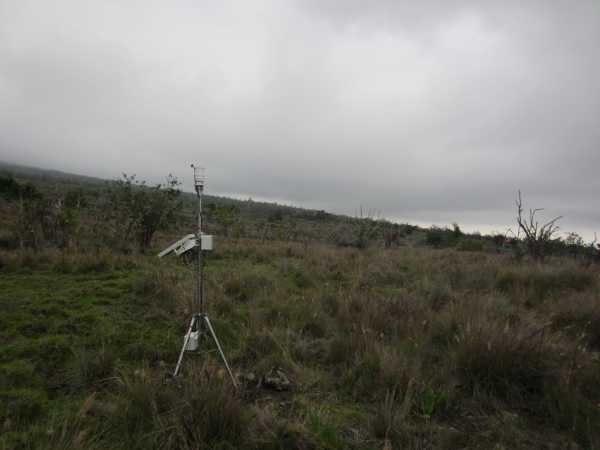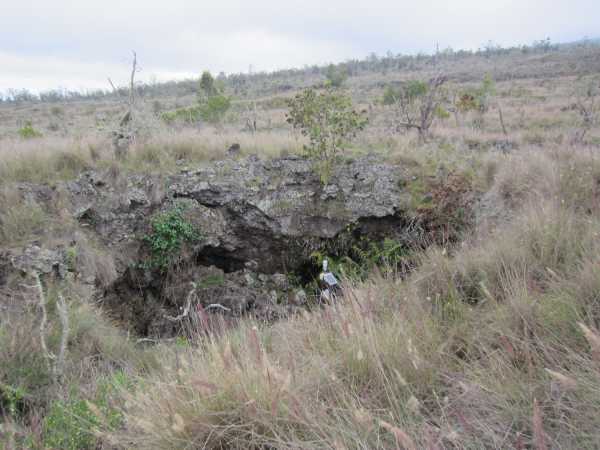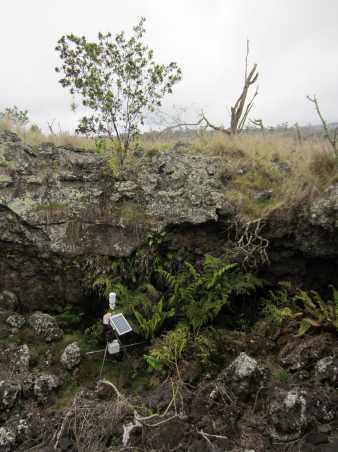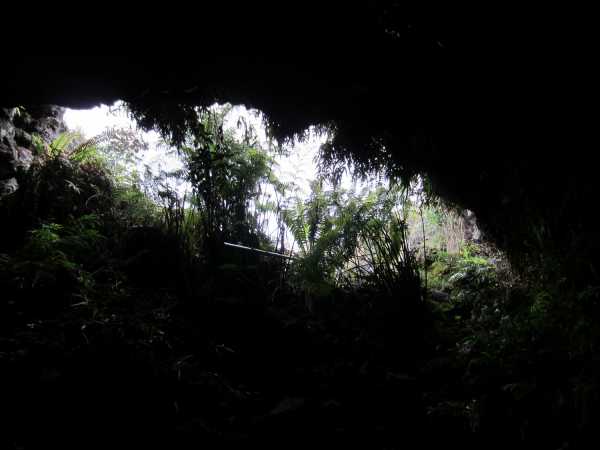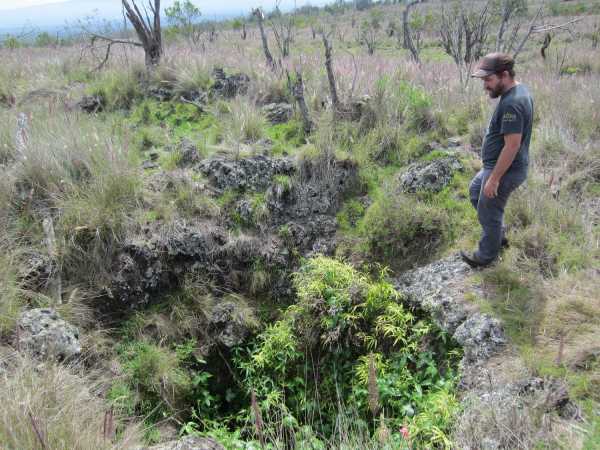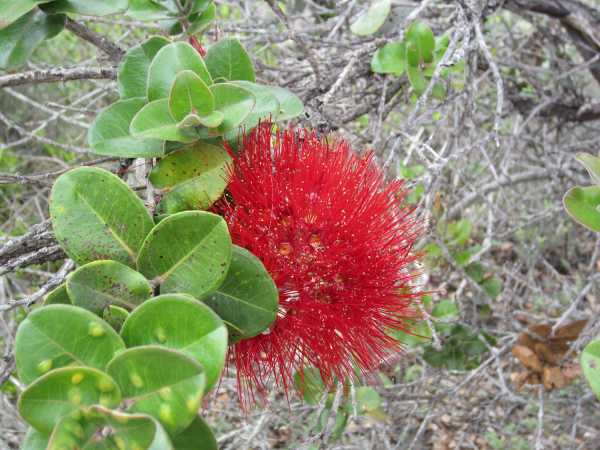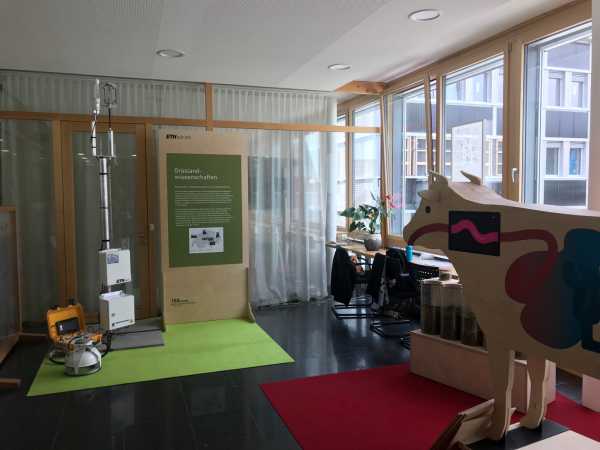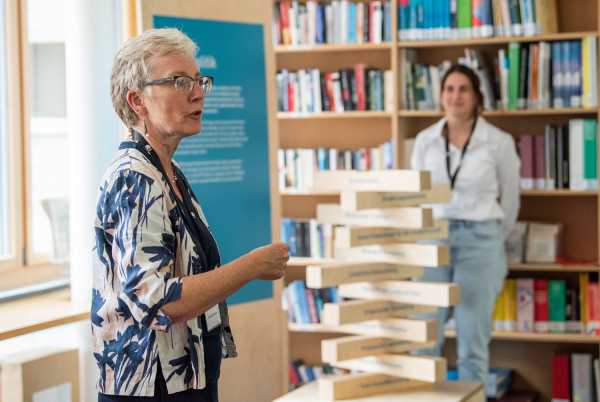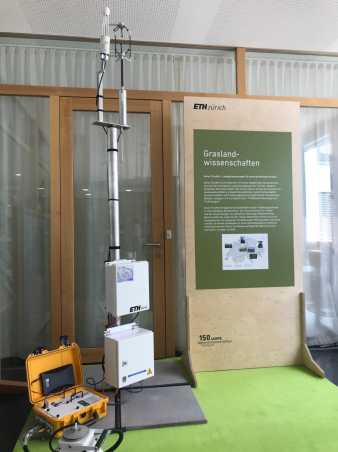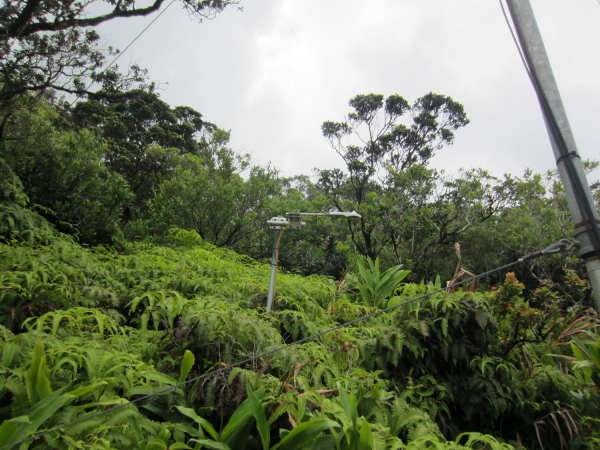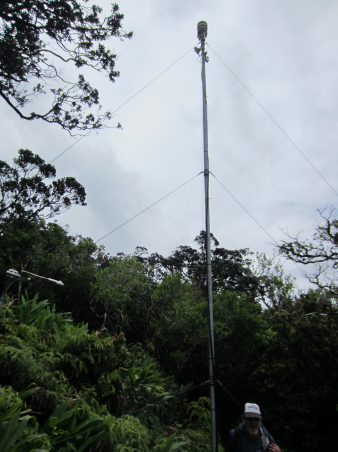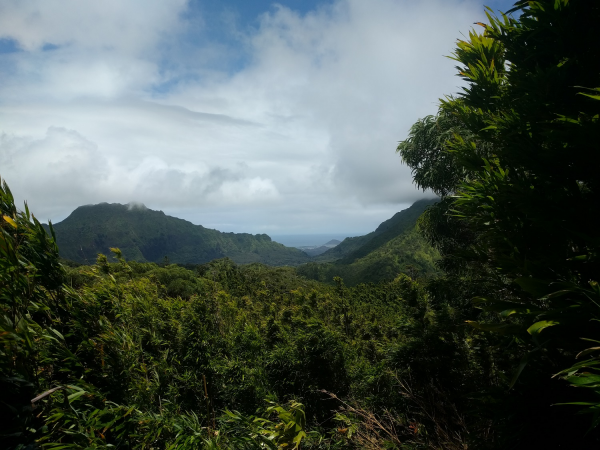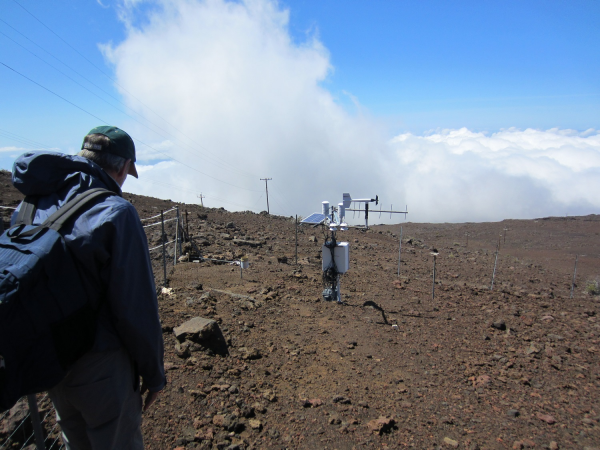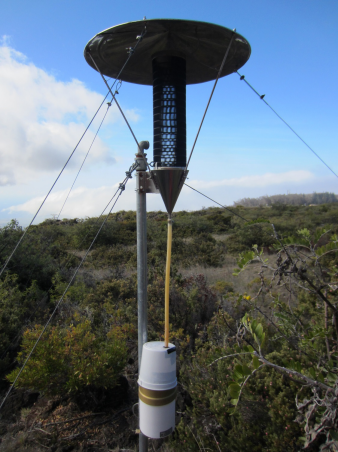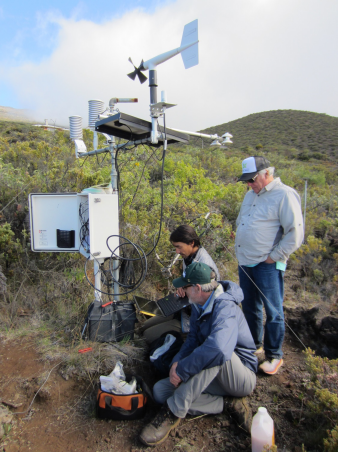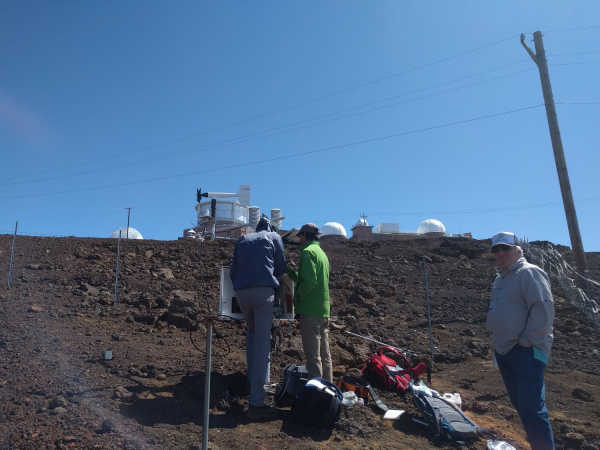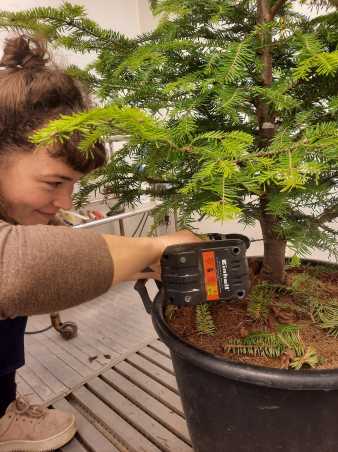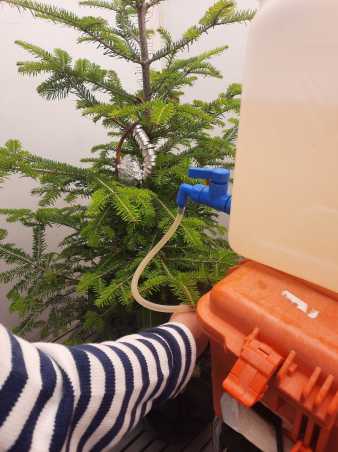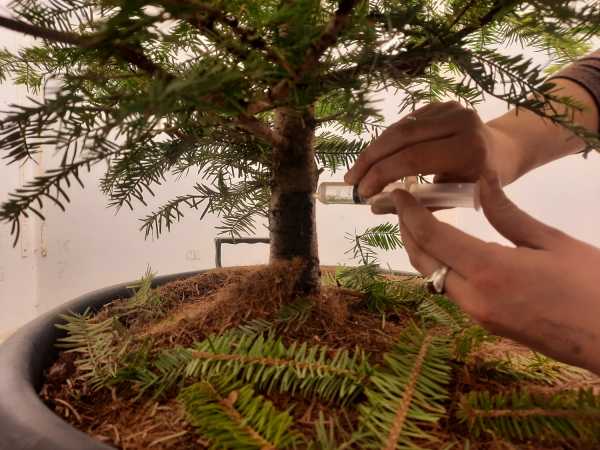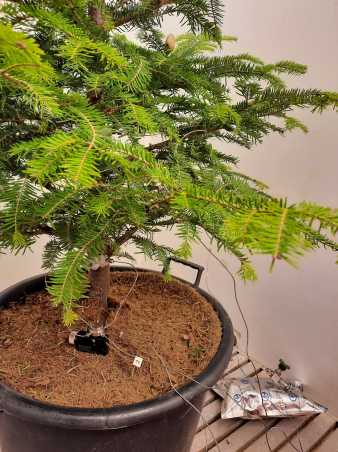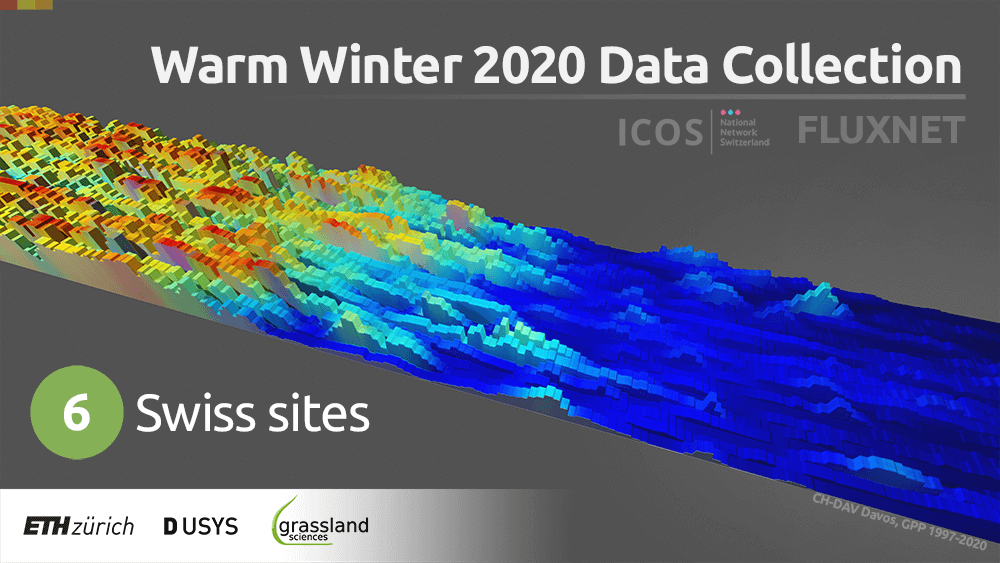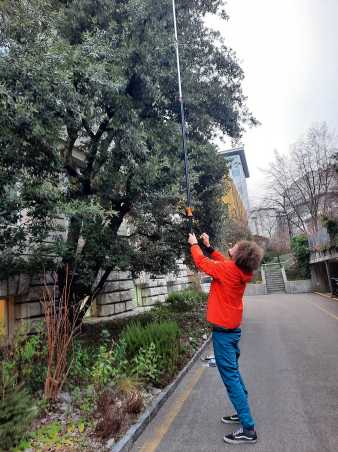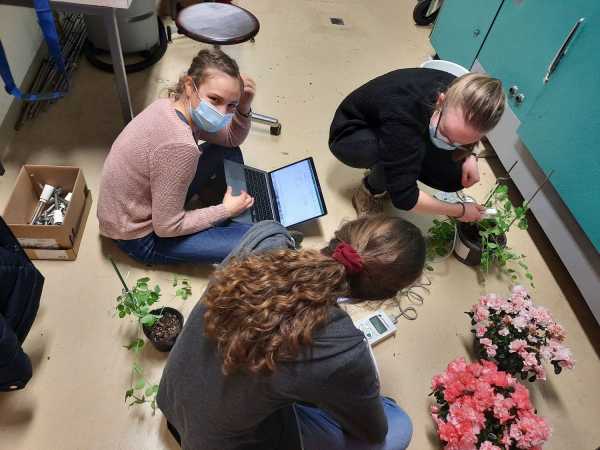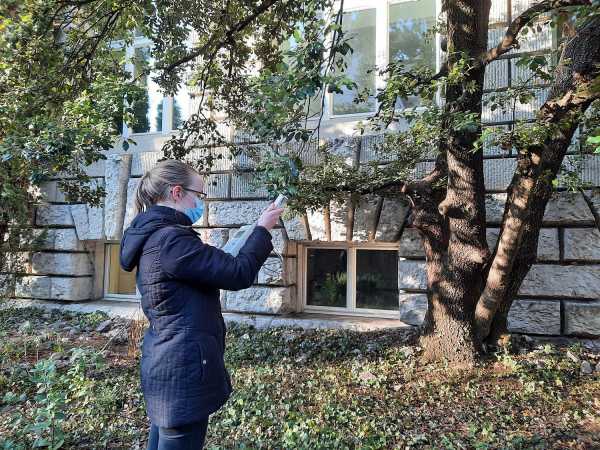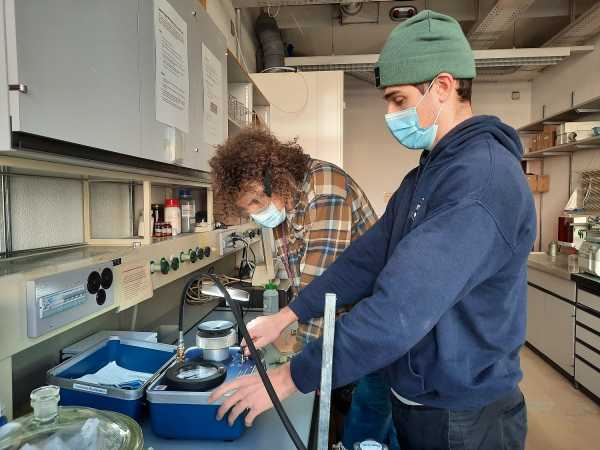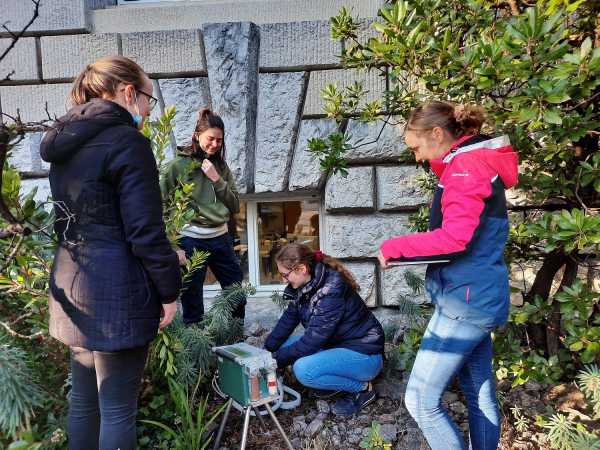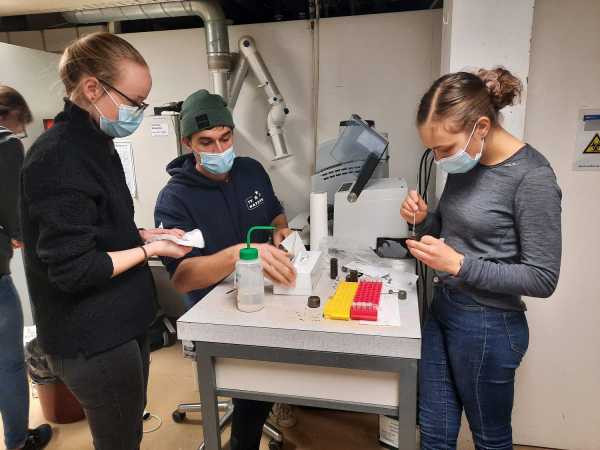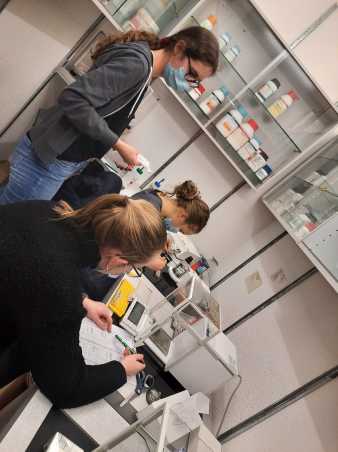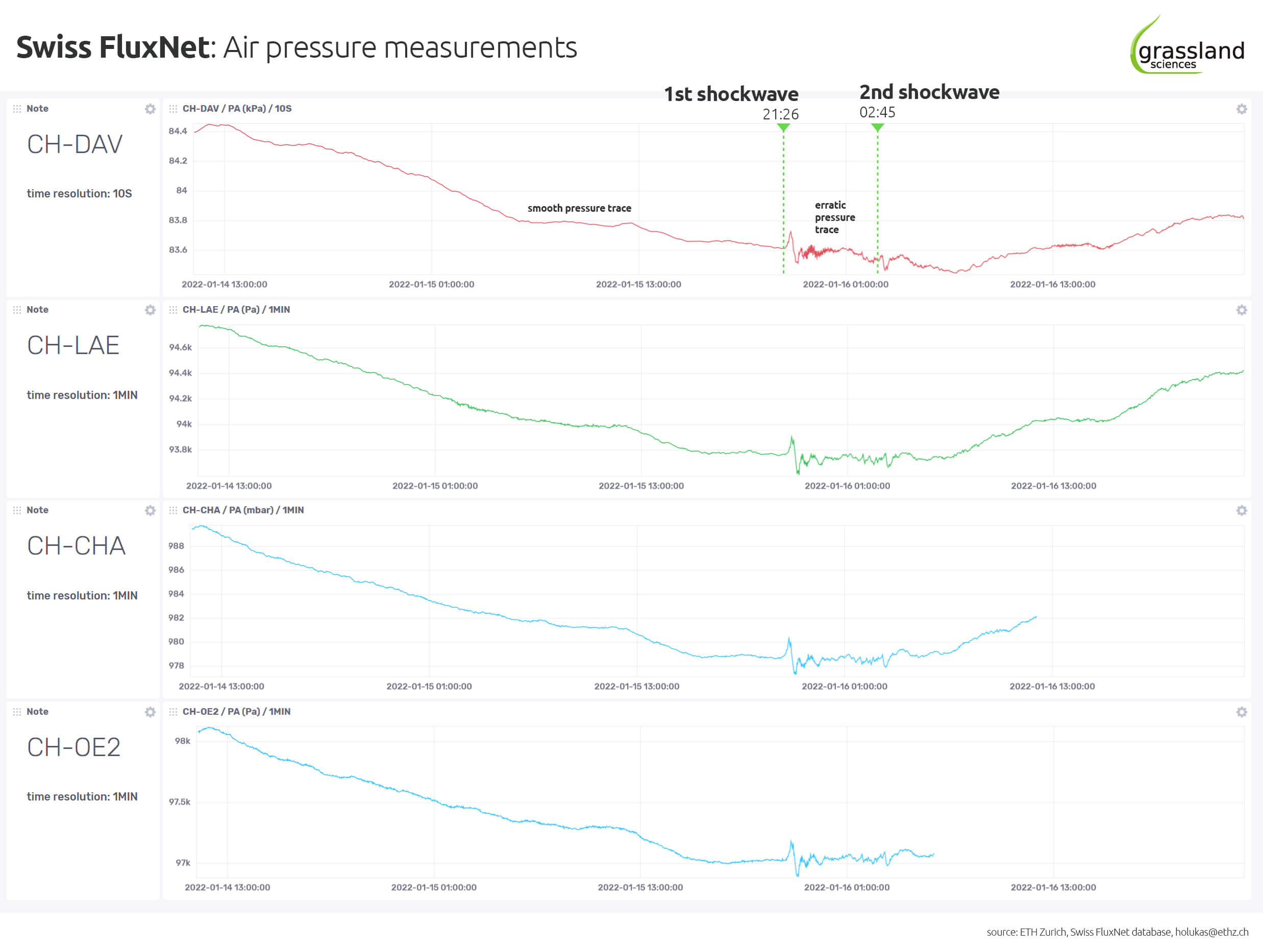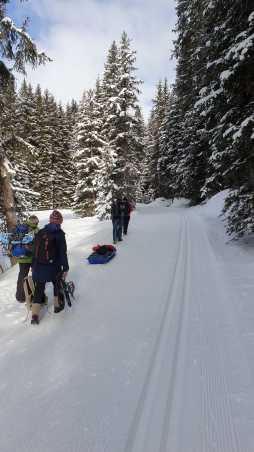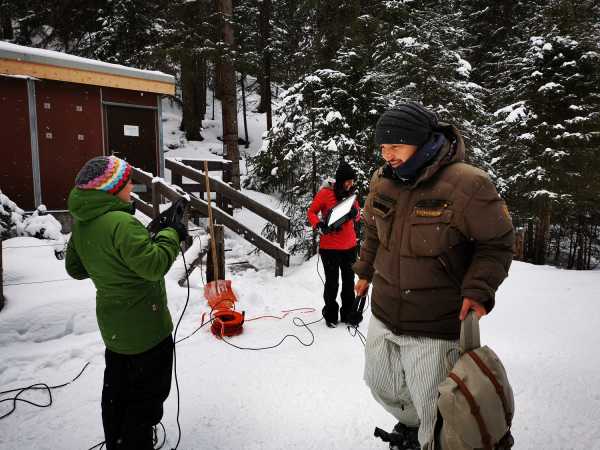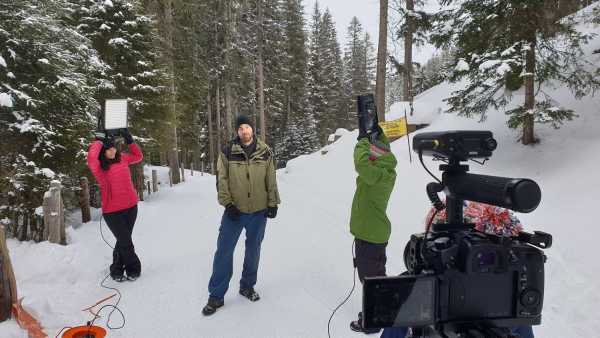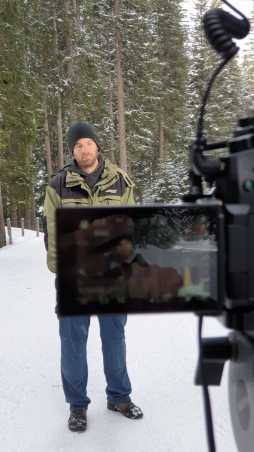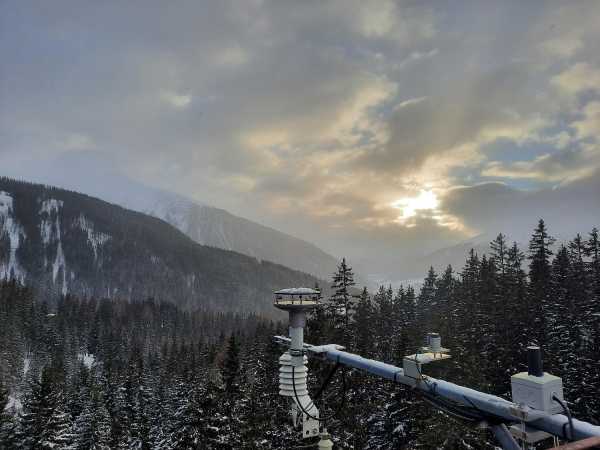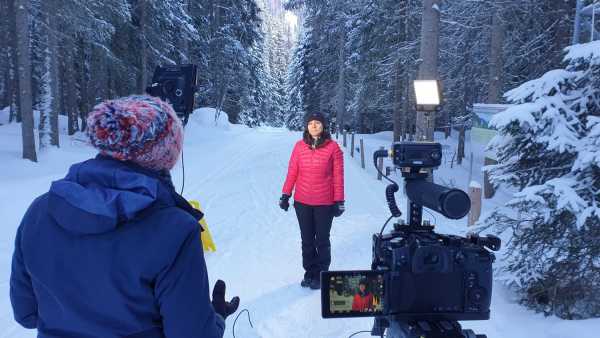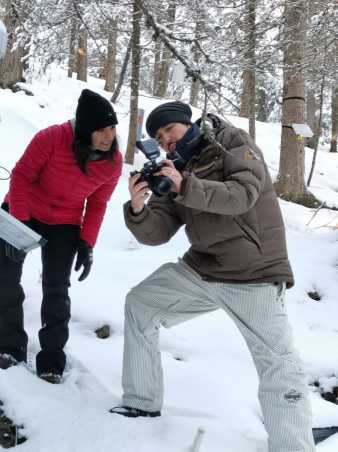2022
December
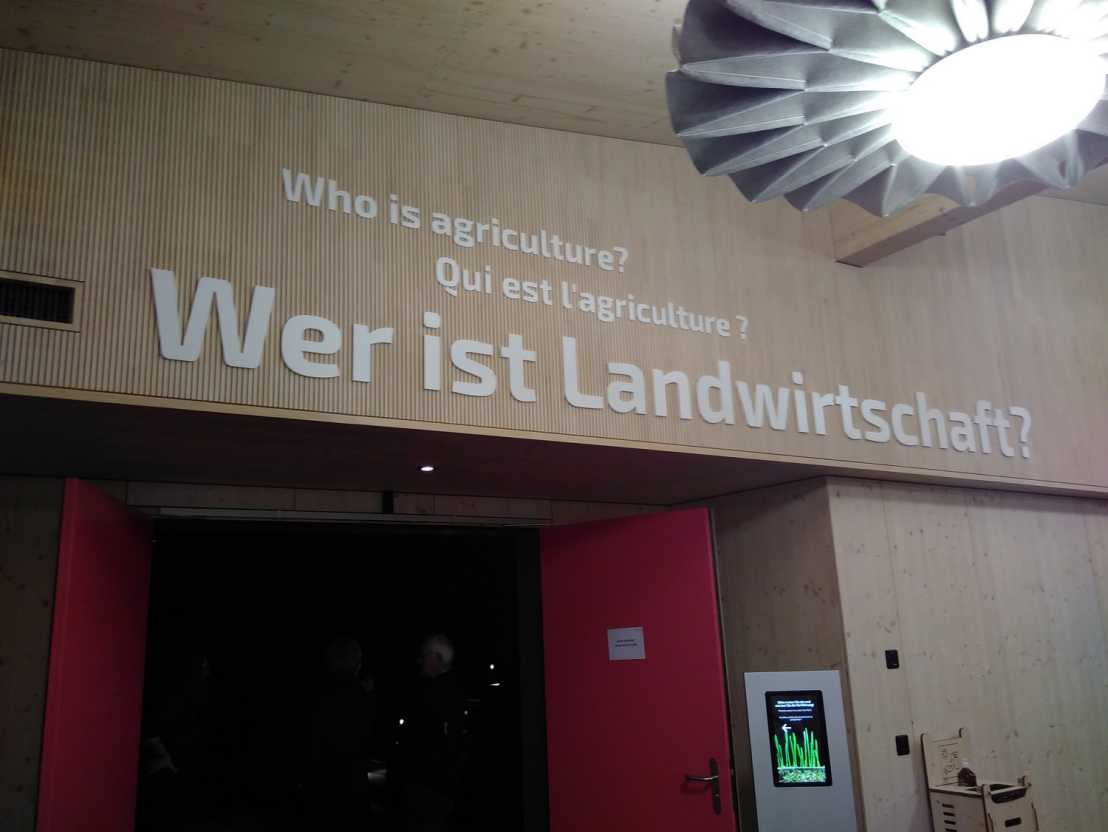
Sometimes when cleaning up, you can find little treasures. Like those hand-colored Hanel glass slides we discovered hidden in one of our cupboards some years ago or the over one hundred year-old fertilizer exhibits we re-discovered this October. The Grassland Group now donated part of these exhibits to the external page Swiss Agricultural Museum in Burgrain (the rest of the exhibits are integrated into the Chemical and Pharmacognostic Collection of ETH). The fertilizers were personally delivered to Burgrain. In exchange, the Grassland delegation got a teaser tour of the museum's very impressive collections and the award-winning museum. We will be back. :-) (21 December 2022)
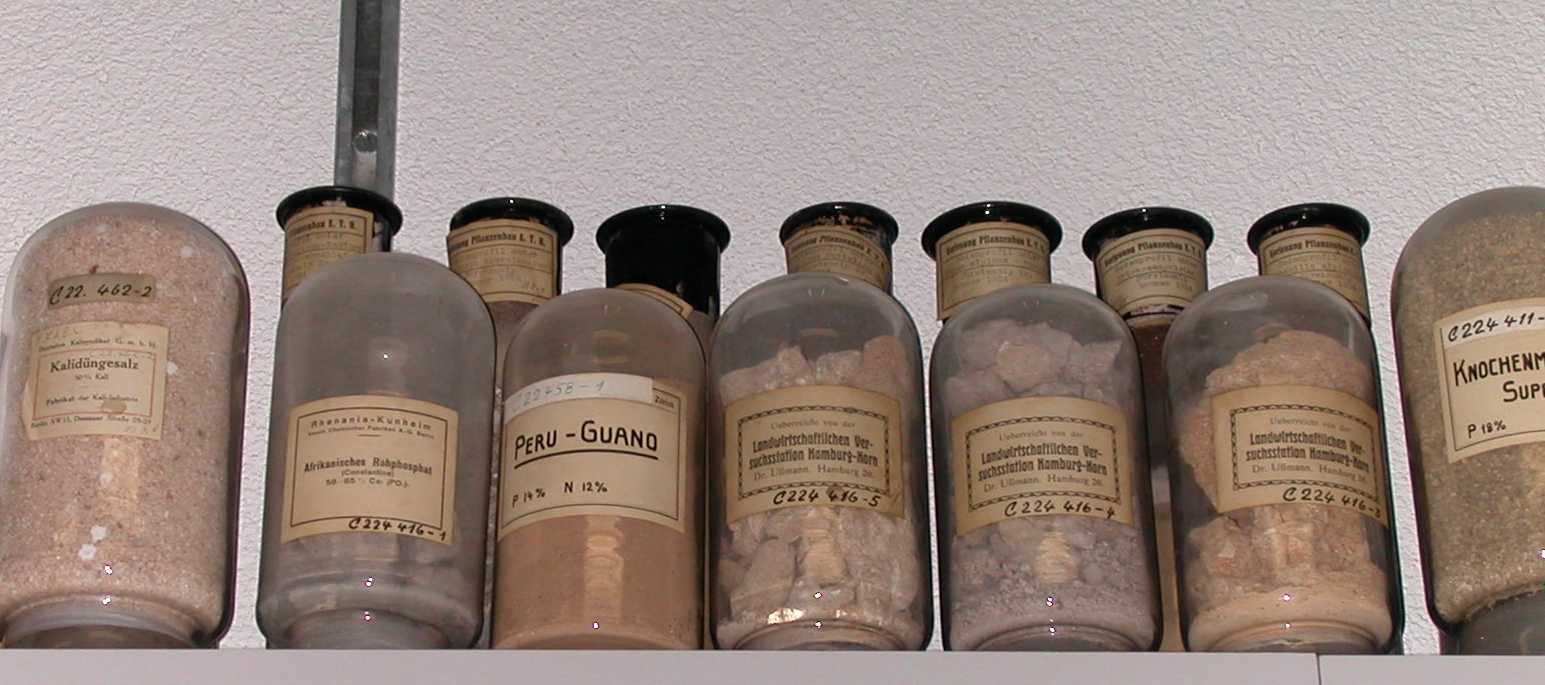
Awards need to be celebrated! Of course, the external page GfÖ Honorary Medal for Nina Buchmann was no exception and so we celebrated this nice recognition of Nina's achievements with an apéro. Nina offered mulled wine and Elisenlebkuchen (gingerbread) from Nuremberg. (16 December 2022)
The Grassland Xmas Party is back in Lichthof! After two years of absence from our "home" (once cancelled, once celebrated in a forest hut), we were able to have our traditional Xmas party in the LFW again. The group celebrated with their families and alumni/alumnae. It was a very nice get together at the end of a successful year that was not always easy for our group. Thanks for organizing, Fabio, Luana, and Yi! (14 December 2022)
Congratulations to Yi Wang! She passed her aptitude colloquium with honors. This was the very first aptitude colloquium the chair, the supervisors and the candidate ever did ;-) (12 December 2022)
"Do meadows and forests sweat like we?", this was the topic of the lecture Nina Buchmann gave at the Regionale Seniorinnen- und Senioren-Verband Winterthur (external page RSVW). The pathway of water through these two ecosystems, how their vegetation takes up water, and how plants can regulate their water loss, were among the topics which triggered a lot of interested questions. (7 December 2022)
November

On Sunday, our group participated at Treffpunkt Science City, ETH Zurich’s public science program for all ages. We hosted a demo stand on external page ICOS Switzerland. The exhibition was dedicated to a special workplace and therefore entitled "Research above the treetops". The visitors could test a CO2 sensor (infrared gas analyzer used for eddy covariance measurements) live, watch a researcher climb the 35 meter high flux tower, and learn a lot about the ICOS measuring network from ICOS Davos station PI Iris Feigenwinter and ICOS Switzerland coordinator Sue Burri. For the little ones, there was the experiment "Climate change in a bottle" to marvel at. The exhibition was organized by our outreach specialist Sabina Keller. (27 November 2022)
Digital innovations for a sustainable agriculture, this was the main topic of our joint project InnoFarm, part of the external page National Research Programme 73. Now the projects within NRP 73 reach their end and short videos tell what was found out. external page Watch on YouTube what the InnoFarm team found out (4:29 min). (25 November 2022)
A delegation of three Grassies represented the group at the 51st Annual Meeting of the Ecological Society of Germany, Austria and Switzerland (GfÖ). The meeting called "external page International Conference on Ecological Sciences" was held jointly with the European Ecological Federation (EEF) and the Société Française d’Écologie et d’Évolution (SFE2) and took place in Metz, France.
In her presentation of results from the ServiceGrass project, Franzi Richter talked about "Provision of multiple ecosystem services in extensively and intensively managed organic and conventional grasslands in Switzerland".
Valentin Klaus chaired the session on "Ecology, functioning and evolution of urban and anthropized systems" in which he also talked about "Restoring urban ecosystem for nature and people". In addition, Valentin presented two posters, one entitled "No yield gap in organic grasslands? Soil nutrients and forage production in organic versus conventional permanent grasslands", the other one called "Upscaling of ecosystem services from plot to farm scale: more complex than you might think".
Nina Buchmann received the external page GfÖ Honorary Medal 2022 for her life time achievements and outstanding contributions in the field of plant and ecosystem ecophysiology. Congratulations! (21-25 November 2022)
Seems to be a busy outreach week: Nina Buchmann was invited to participate in the external page Konstanzer Wissenschaftsforum (Science Forum Konstanz) on “Klima im Wandel: Von Kipppunkten, Korallen und Klimakonferenzen” and give a short talk about “Agrarökosysteme: Treiber oder Getriebene vom Klimawandel?” (11 November 2022)
It has become a tradition that our group participates at the "external page Nationaler Zukunftstag". We offer a one-day workshop for kids who are interested to learn about job opportunities in science and at ETH Zurich. This year, we hosted eight children in our lab and workshop. Guided by Sabina Keller, who organize the day, Annika Ackermann, Philip Meier, Anna K. Gilgen and Roland A. Werner, the kids extracted leaf pigments in the lab and built their own soil moisture sensor in the workshop. Tired, but with first experiences in pipetting and soldering, the kids left LFW in the late afternoon. (10 November 2022)
Interactions with colleagues on-site resumed this year: Nina Buchmann informed colleagues from the external page Global Atmospheric Watch Switzerland about „Climate mitigation through terrestrial ecosystems: The challenge with nature-based solutions”. Some unusual insights for the atmospheric community. (9 November 2022)
Sabina Keller had received a grant from the WFSC to support the development of our outreach activity on stable isotopes. Now that the workshop is ready and was carried out twice already, Sabina has written a short blog story about the development of the workshop. (9 November 2022)
Showing youngsters what science is all about (see news item above), but also providing scientific info to their grand-parents is part of the outreach activities of our group. Nina Buchmann was invited by the external page Seniorenforum Werdenberg to talk about "Was essen wir morgen? Das Welternährungssystem". More then 100 persons attended the lecture, despite the great fall weather! (8 November 2022)
Very nice recognition for great work: The New Phytologist paper "external page Why trees grow at night", co-authored by Nina Buchmann and Werner Eugster, belongs to the journal's most read articles from 2020/2021. Check out other highly read and cited articles on New Phytologist's external page special page "Most read: Articles". (8 November 2022)
Mercury (Hg) can evade to the atmosphere from legacy contaminated sites. However, such legacy emissions from landfills, for example, are poorly characterized in national and global Hg inventories. Within the EMOSGROW project led by colleagues at TU Braunschweig, Stefan Osterwalder investigates outgassing of gaseous elemental mercury (Hg0) from the soil-groundwater system of a landfill situated in the upper Valais. Between end of September and beginning of November, he had installed mercury passive air samplers (MerPAS) to determine Hg0 concentrations in groundwater wells, soil and ambient air. Now, all samplers are back in the lab and ready for analysis. (2 November 2022)
A warm welcome to Xin Zou who is joining our group as an external exchange doctoral student from the Chinese Academy of Sciences for the next one and a half years. (1 November 2022)
October
The 2nd Basel Forest Drought Workshop brought together many researchers dealing with drought responses of trees and forests. Nina Buchmann was invited to talk about "Effects of the combined drought-heatwave in summer 2022 on a mixed deciduous forest", a summary of the intensive heatwave campaign which took place in summer 2022 and described below ;-) (21 October 2022)
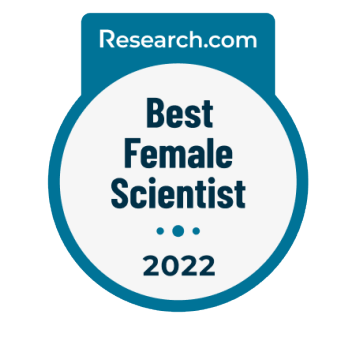
Some emails come as a surprise. Research.com has just released their 1st edition of the external page annual ranking of top female scientists in the world. They write: "The aim of this ranking is to inspire female scholars, women considering an academic career, as well as decision-makers worldwide with the example of successful women in the scientific community". And Nina Buchmann is one of them, ranking external page 5th for Switzerland. (20 October 2022)
Our technicians Philip Meier and Thomas Baur, along with Nina Buchmann, are coauthors on an article about using the FTTS to detect forest pathogens on Hawai‘i. The article entitled “Aerial branch sampling to detect forest pathogens” was just published in Drones and describes how the FTTS was used in research helping to protect the native ‘ōhi’a tree on the Hawai‘ian islands. The article made even made it on the external page cover of the journal – what an amazing platform for the FTTS. Well done! Find out more in the external page full article. (15 October 2022)
After almost five years in our tech team, Markus Staudinger is leaving our group. At his farewell apero, he was (to the best of our knowledge) the first non-doctoral student of the group to receive a crafted hat. Our creative young scientists made a special tech hat/helmet for him - what a treat. Thank you Markus and all the best! (13 October 2022)
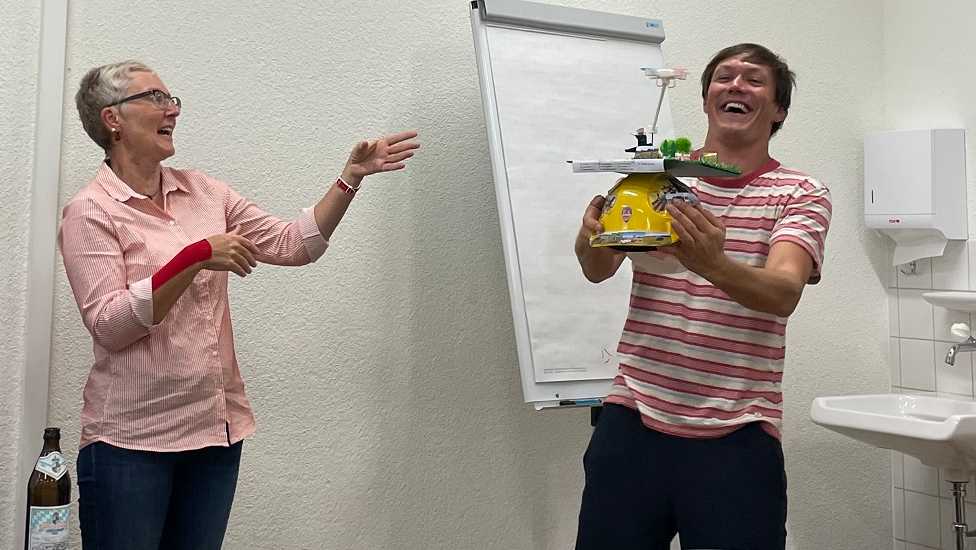
After we said goodbye to our guest Sergio Aranda and our IAESTE intern Anastasiia Bolshakova end of September, we now bid farewell to Ruikun Gou. Ruikun joined our group as a visiting PhD student last December. During his stay with the group, Ruikun also learned about our apéro tradition. So, of course he followed the tradition and offered a very tasty farewell apéro on the terrace. (10 October 2022)
Congratulations to Margaux Didion-Gency: She successfully defended her doctoral thesis "Impact of warmer and drier climate and tree species interactions on the carbon relations in European forests" with great results! Well done, Margaux!!! (6 October 2022)
September
Iris Feigenwinter and Philip Meier welcomed a group of researchers from the International Symposium on Snow 2022 at our ICOS Class 1 Station Davos. Iris and Philip lead the group through the subcanopy of the spruce forest and introduced our station and the measurements. The info board and our excursion guide once again proved very helpful. (28 September 2022)
A final post-heatwave measurement officially concluded our intensive measurement campaign to capture this summer's heatwave at Lägeren. The heatwave was characterized by a month without rain (4 July to 4 August), and highest ever recorded air temperature and VPD at the Lägeren forest site (33.9°C on 4 August). The numbers coming with our campaign are quite impressive: on seven field days from 14 July to 23 September we sampled 194 branches for leaf water potential, stomatal conductance, specific leaf area, metabolome, chlorophyll content, xylem conductivity, carbon isotopes, non-saturated carbohydrates, and more, took 447 samples for water isotope analysis as well as some airborne and tower-borne spectral images. A huge thank you to all the people involved in the campaign, particularly the doctoral students who actually made this happen! (23 September 2022)

Many members of the Grassland Sciences group participated in the external page ICOS Science Conference in Utrecht. For some, it was the first opportunity to share their research with an international audience, for others, it was the first in-person conference after a long time. Lukas Hörtnagl presented results from Davos that show the huge impact of heat days on carbon budgets. Liliana Scapucci and Luana Krebs presented posters on their work in the COCO project. Ankit Shekhar talked about how forests increase their resistance to extreme atmospheric dryness investigated within the FEVER project. Well done, all of you. (13-15 September 2022)
The heatwave campaign might be finished at Lägeren forest, but all the samples collected in the field need to be analyzed in the lab. Hence, our IAESTE intern Anastasiia Bolshakova stated working on the analysis of what we call the "conductivity twigs". Conductive tissue is colored by putting the twigs into a methylene blue solution in a climate chamber. Anastasiia then produces cross sections of the twigs at different positions along the twigs. Cross sections of four different species (beech, maple, fir, and spruce) will be analyzed for the conductive area. These data will complement water potential and stomatal conductance measurements. (15 September 2022)
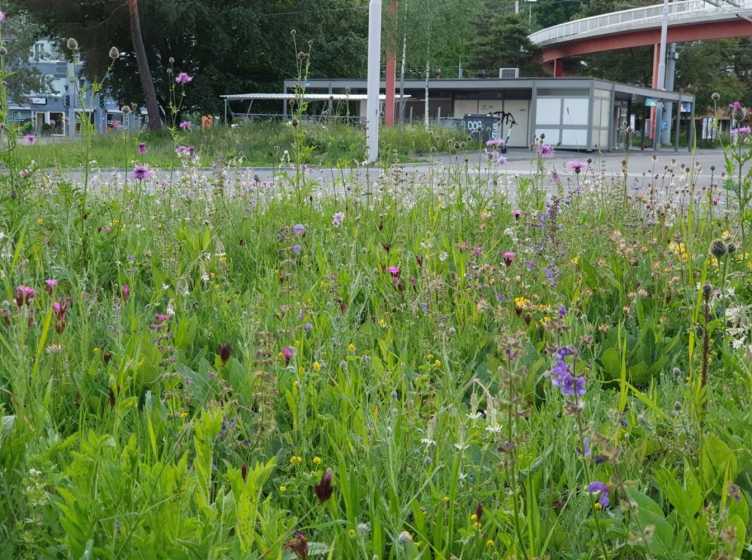
Biodiverse grasslands come to town: Valentin Klaus was interviewed by external page gplus, the magazine for the green sector, about how to increase the public acceptance of urban meadows. Such meadows have a much higher value for biodiversity compared to intensively managed lawns. Many options are available! Read more in the Download article (PDF, 2.1 MB) (in German). (9 September 2022)

The first volume of FLUXES – The European Greenhouse Gas Bulletin – has recently been published by external page ICOS. It focuses on regional and inter-annual changes in carbon sinks in Europe. Both ICOS Class 1 stations in external page ICOS Switzerland, Jungfraujoch and Davos, were included in the analyses. FLUXES aims at highlighting climate issues to an audience of policymakers, policy advisors, and climate journalists. Have a look at the external page compilation online. (9 September 2022)
University of Notre Dame? Not in France but in the USA, in Indiana to be precise. Nina Buchmann was invited to give a talk there in the framework of the Environmental Change Initiative seminar series, on zoom. The topic was "Response of forests and agroecosystems to environmental change: Insights from the Swiss FluxNet". (7 September 2022)
August

This year's external page ICOS-CH Annual Meeting, organized by the ICOS-CH coordinator Susanne Burri was hosted by the Atmospheric Sciences Group of external page Markus Kalberer at University of Basel. The program included updates from ICOS RI, ICOS Switzerland as well as from the two ICOS Class 1 stations Jungfraujoch and Davos. This more administrative part was complemented by scientific talks and an insight into activities going on within ICOS Cities, especially the effort of setting up an outreach projects for secondary schools in Switzerland. We were especially happy about so many newcomers to the ICOS-CH consortium this year and enjoyed chatting and getting to know each other during long coffee breaks as well as during lunch at the newly built and very impressive Biozentrum. With the sun coming out in the afternoon, we could even visit the Basel urban station. It has one of the longest urban CO2 flux records worldwide (permanently operated since 2004) and is planned to become an ICOS Ecosystem Associated station. (31 August 2022)
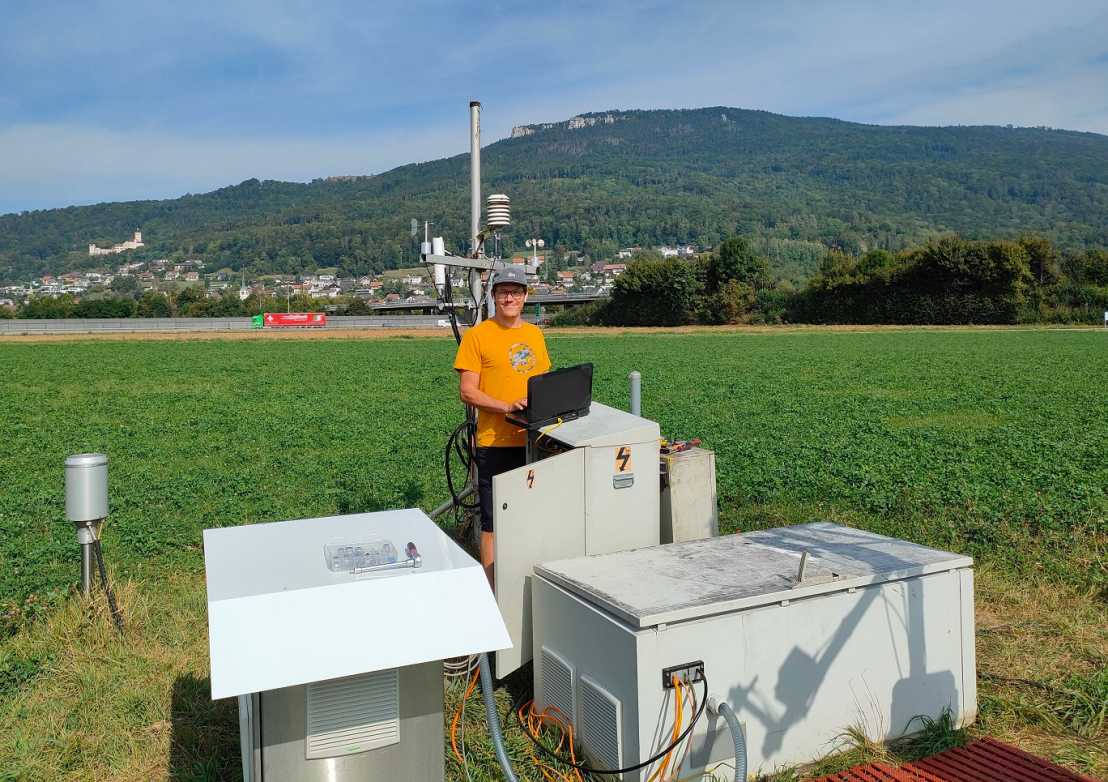
Good news for the DONA project: the QCL laser has been successfully installed in Oensingen. After being checked in the lab and some trouble-shooting, the laser runs smoothly (as the smiling technician confirms). The device will now be used to study N2O and CH4 fluxes during the crop rotation from currently grass-ley to the coming winter wheat. This transition period will be particularly interesting since flux data for such transitions are even more scarce than for "normal" cropping seasons of croplands. Measurements will continue for the entire growing season of winter wheat, which will be planted mid October. (30 August 2022)
Arctic warming thaws permafrost, which leads to enhanced soil mercury transport to the Arctic Ocean. These inputs are assumed to be largely re-emitted from the Arctic Ocean to the atmosphere when sea ice declines during the summer time. This hypothesis was suggested to explain the well-known Arctic summertime peak of atmospheric elemental mercury. However, a new study lead by Stefan Osterwalder and Jeroen Sonke (Géosciences Environnement Toulouse) and co-authored by an international team of researchers proved this hypothesis wrong. Investigating the mercury isotope signatures in arctic rivers, the ocean and the atmosphere showed that terrestrial mercury transported to the Arctic Ocean is not emitted to the global atmosphere, but rather buried in the marine sediment. Find out more in the USYS News or read the external page full article in Nature Communications. (24 August 2022)
End of August is the typical time for our group retreat. This time we went to external page Kloster Fischingen, thanks Philip for the suggestion! The program included some regular sessions, e.g., to recall the past 12 months, what had happened, where did we succeed with our plans and where not. But also new topics were addressed: Mana shared her experiences about Transitions in Academia, Sabina involved us in three activities on environmental education. We split up in breakout groups to collect ides and discuss stakeholder engagement guided by Valentin as well as to explore the potential links between teaching and outreach. Lots of opportunities to interact, many ideas were born. The great food and the beautifull location facilitated this very successful and enjoyful retreat. (23/24 August 2022)
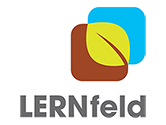
Sabina Keller, in cooperation with external page GLOBE Switzerland, organized the LERNfeld further education day on the subject of agricultural research on climate change for teachers took place in Eschikon Lindau. In the morning, the teachers were guests at the ETH-Research Station for Plant Sciences. After an introductory lecture on drought stress in grasslands by Anna K. Gilgen, there was a guided tour with scientists to the phenotyping platform and the mesocosms. With Sabina Keller, the teachers conducted two learning activities on the effects of extreme weather events and on litter decomposition in grasslands. In the afternoon, a visit to the external page AgroVet-Strickhof research station was on the agenda. A guided tour through the barn and the metabolic center gave an insight into current livestock research. Following this, the teachers were able to try out two further learning activities on cows. (18 August 2022)
The intensive heat wave measurement campaign brought along interesting opportunities. Stefan Osterwalder uses the campaign to test whether atmospheric elemental mercury (Hg0) uptake will be reduced during the heatwave. Therefore, he installed ten Mercury Passive Air Samplers (MerPAS) on the Lägeren tower between 2 and 45 m height to compare Hg0 concentrations along the profile. Now that the heat wave is over, the sampling will be repeated under "normal" conditions. (16 August 2022)

Anna K. Gilgen was invited as a contributor to the 10th WFS Summer School organised by the World Food System Center. Anna talked about biodiversity and climate change and how they concern the food system. The lively participant group of 25 students from 19 different countries was very interested and asked a lot of good questions. (15 August 2022)
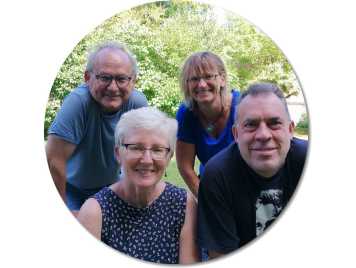
Preparing the panel interview for our ERC Synergy proposal in Brussels in a couple of weeks needs a lot of discussions within our team: What is the core info we need to present in 10 min to the panel? How best to show innovation, excellence and breakthroughs on - at the most - ten slides? Are the slides too busy (or too boring), are they informative enough? Crucial questions to answer and implement, together, assisted by great weather and the beautiful building and garden of the external page Pufendorf Institute for Advanced Studies in Lund. Cross fingers for the interview! (9 to 12 August 2022)
The heatwave campaign kept us busy with fieldwork for a month. Many group members helped with the diverse tasks and measurements. This will allow us to better understand the forest's reaction to the heatwave, including the hottest day since the start of our measurements at Lägeren. What a great effort of the entire group - thank you. (16 August 2022)
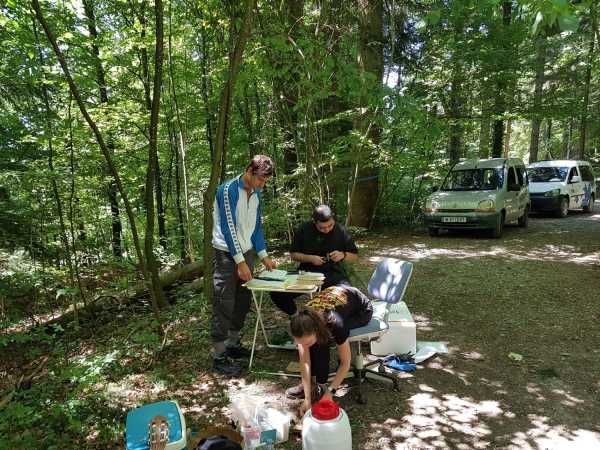 Midday sampling preparation for xylem conductivity.
Midday sampling preparation for xylem conductivity.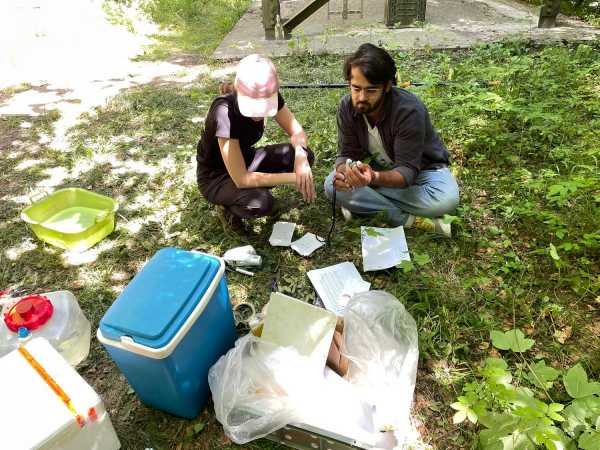 Preparation to fly the FTTS for midday twig sampling.
Preparation to fly the FTTS for midday twig sampling.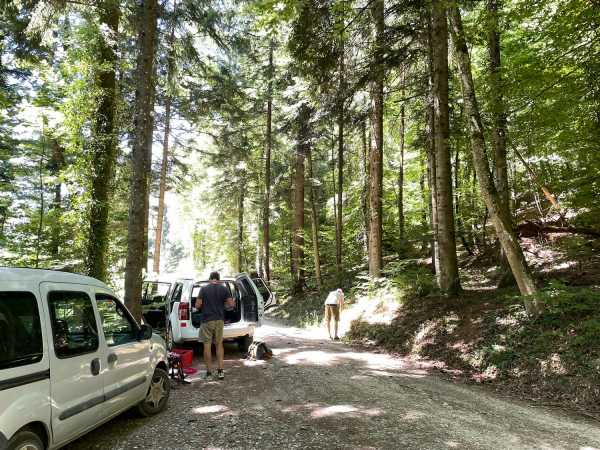 Soil respiration measurement with LI-8100 during the heatwave campaign.
Soil respiration measurement with LI-8100 during the heatwave campaign.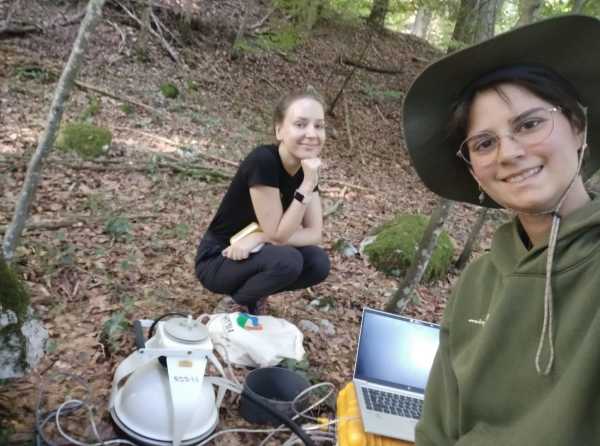 Soil respiration measurement in progress.
Soil respiration measurement in progress.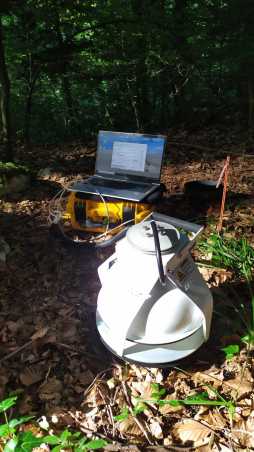 Preparing a twig to cut it under water for measuring xylem conductivity.
Preparing a twig to cut it under water for measuring xylem conductivity.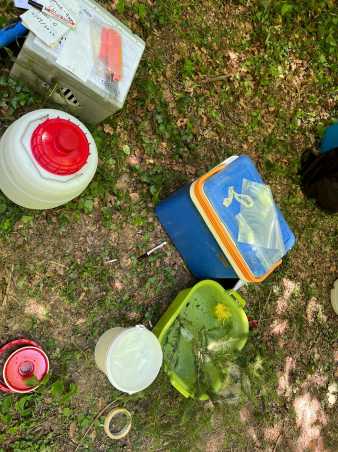 Cut twig inside falcon tube filled with water ready for further analysis.
Cut twig inside falcon tube filled with water ready for further analysis.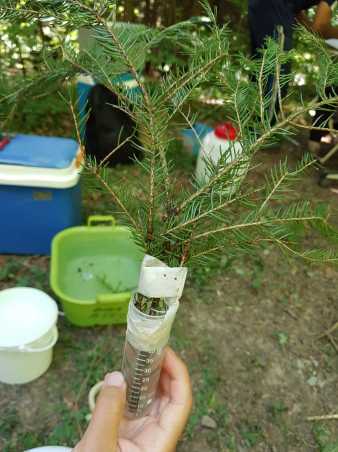 Twigs are ready to be transported to the lab.
Twigs are ready to be transported to the lab.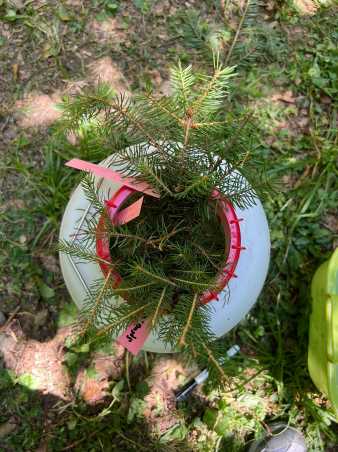 Using the telescopic sickle to cut twigs from 10-meter height.
Using the telescopic sickle to cut twigs from 10-meter height.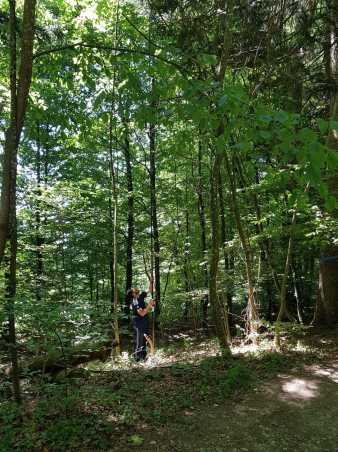 Measuring midday leaf water potential.
Measuring midday leaf water potential.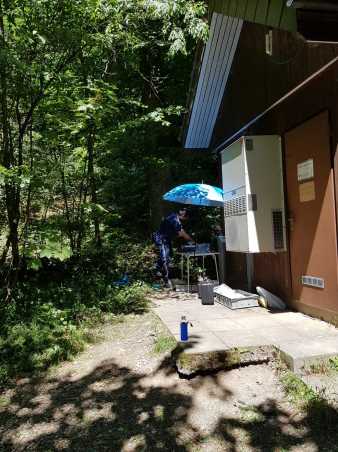 Transporting the twigs back to ETH.
Transporting the twigs back to ETH.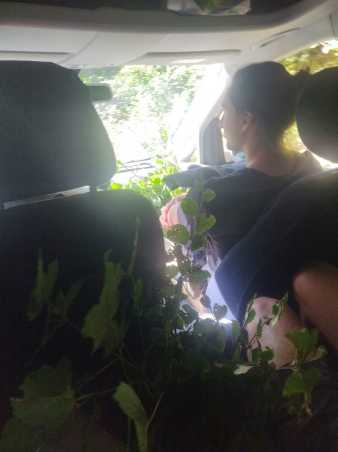
July
Who is the winner? Plants and microbes compete for soil nitrogen. If the plants win, soil N is taken up by roots and used for growth. If the microbes win, N2O is being emitted. In Regine Maier´s paper on research within the InnoFarm project, we could show that plants win when they are tall and active, independent of the soil water content. However, if plants are small, microbes win. Not good for climate, but perfect insights to come up with climate-smart mitigation strategies: plant-growth adapted N fertilization is key! Read the full success external page story! (17 July 2022)
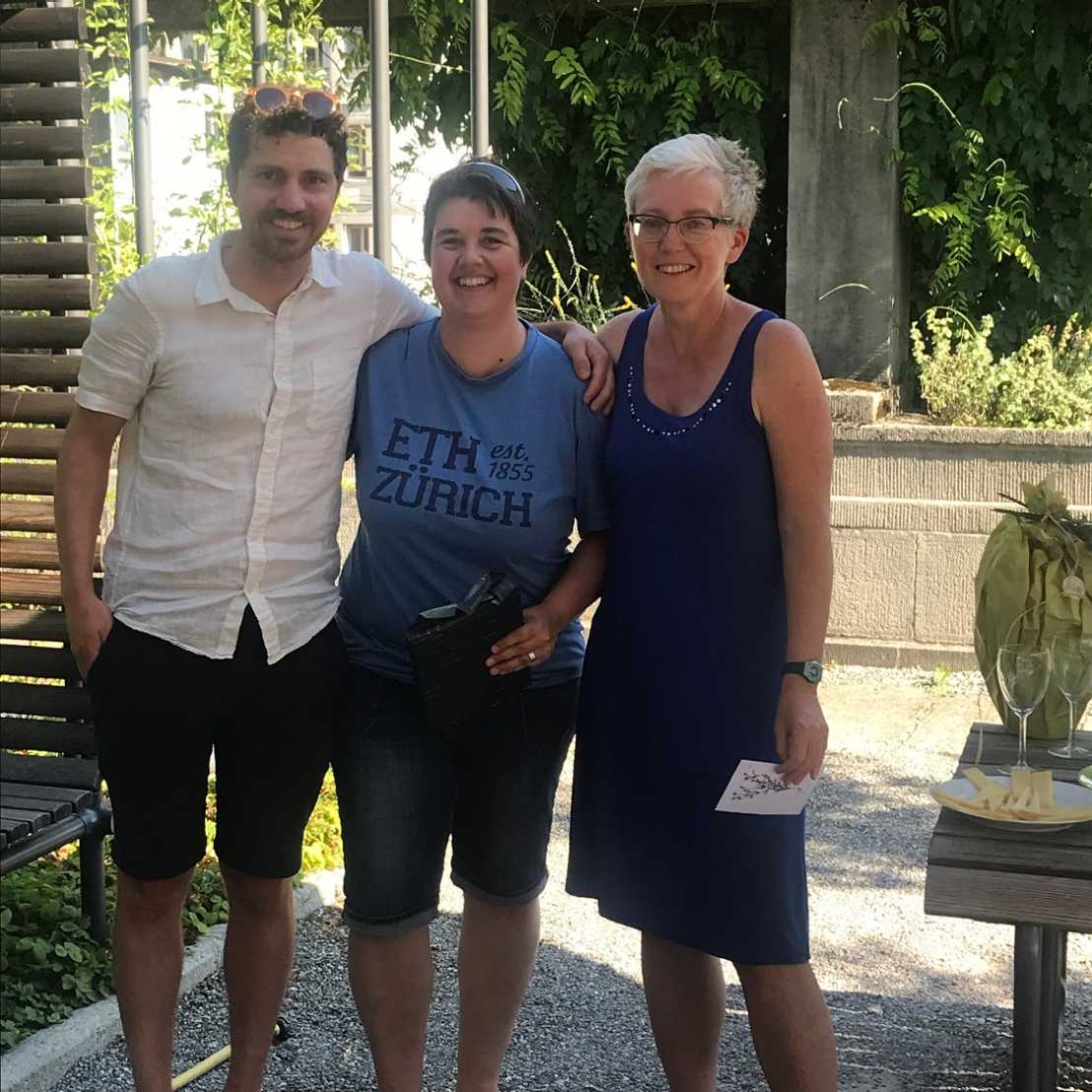
After almost exactly three years at ETH Zurich, external page Prof. Benjamin Stocker and his group are moving to University of Bern, where Beni was appointed Assistant Professor for Geocomputation and Earth Observation. During the time at ETH, Beni's Computational Ecosystem Science group was associated with the Grassland Sciences group. At his farewell apero, Beni said thank you for the support he and the group got in the past three years and the Grassies wished him all the best for the new adventure in Bern. Good luck! (15 July 2022)
Start of our spontaneous intensive measurement campaign to capture the response of the Lägeren forest to the current heatwave. Many group members are helping out with sampling and measurements. Have a look at the pictures below to get an impression of how everything is rolling out. (14 July 2022)
A warm welcome to Anastasiia Bolshakova who is joining our group as an external page IAESTE intern for the next three months. (8 July 2022)

In spring 2020, the pandemic forced us to cancel the event to celebrate the labelling of the two external page ICOS-CH stations at Jungfraujoch and Davos. Now, we were finally able to make it happen. The ICOS-CH team met for a guided tour at the main station in Zurich. Have a look at the external page news on ICOS-CH to find out more about the celebration. (7 July 2022)
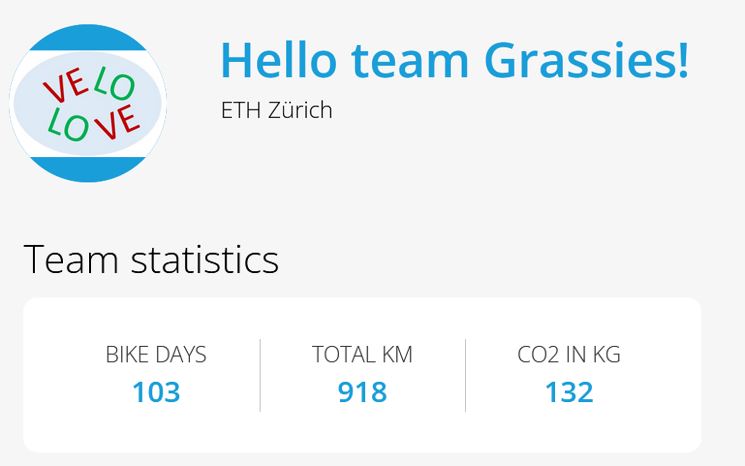
Our Grassies team (Ankit, Franzi, Roland and Sabina) has cycled 918 km to work in the external page bike to work challenge over the past two months and saved 132 kg of CO2. Keep cycling. (7 July 2022)
Big effort at Chamau: the QCL laser and all the attached instruments were removed from the field. The laser was installed at the site in 2021 and has been running continuously for N2O and CH4 measurements until this July. It will be used to build the mobile station for Fabio Turco’s DONA project in September. Lots of staff and heavy lifting were involved in the action at Chamau. 6 July 2022)
As part of the "Open Week Education" in the framework of the 150 years anniversary of the Agricultural Sciences, two classes from the Hohe Promenade High School attended our workshop 'On the trace of stable isotopes from grass to milk'. After an introductory lecture by Valentin Klaus, the students got to see the premiere of our external page new mass spec film starring Annika Ackermann. In groups, the students then visited the isotope mass spectrometer, the climate chambers, and the workshop, and prepared powder from unknown milk samples for analysis in the IsoLab. The morning was a great experience for both the students and us. The workshop was organized by Sabina Keller. She got support from Anna, Annika, Franzi, Iris, Luana, Regine, Philip, Thomas and Valentin. Many thanks to everyone involved! (6 July 2022)
Grand finale of the excursion season with our traditional excursion to Alp Weissenstein. For more than 15 years, the group has been offering an excursion to our (sub-)alpine site at Albulapass - for many years together with Michael Kreuzer, former Professor for Animal Nutrition at IAS, now in collaboration with external page AgroVet-Strickhof. This year, we were unlucky with the weather. Rain started right before the students arrived in Preda and did not stop until shortly before lunch. Despite the rain gear, everyone was soaked by the time the group arrived on Alp Weissenstein and could finally sit inside in the barn. Nevertheless, Anna K. Gilgen introduced our eddy covariance measurements, and Franzi Richter presented the different grassland communities that can be found on Alp Weissenstein. After lunch, we could move outside to see some plants, the surroundings of the Alp and the different barns. The sun now dried our clothes. Thanks a lot to the students for being in such a good mood despite all the rain and for asking so many good questions. (4 July 2022)
June
Earlier this year (see March news), Nina Buchmann was named a Distinguished Alumna of the University of Utah School of Biological Sciences. Guest Professor external page Jim Ehleringer now brought the actual award with him from his trip to the US where he taught in the external page IsoCamp. In today's lab meeting, Jim presented Nina with the Distinguished Lab Alumni Award. Congratulations, Nina! (30 June 2022)
A warm welcome to Sergio Aranda who is joining us as a visiting PhD student until September. Sergio studies at University of Granada and will work on his eddy covariance data while in Zurich. (29 June 2022)
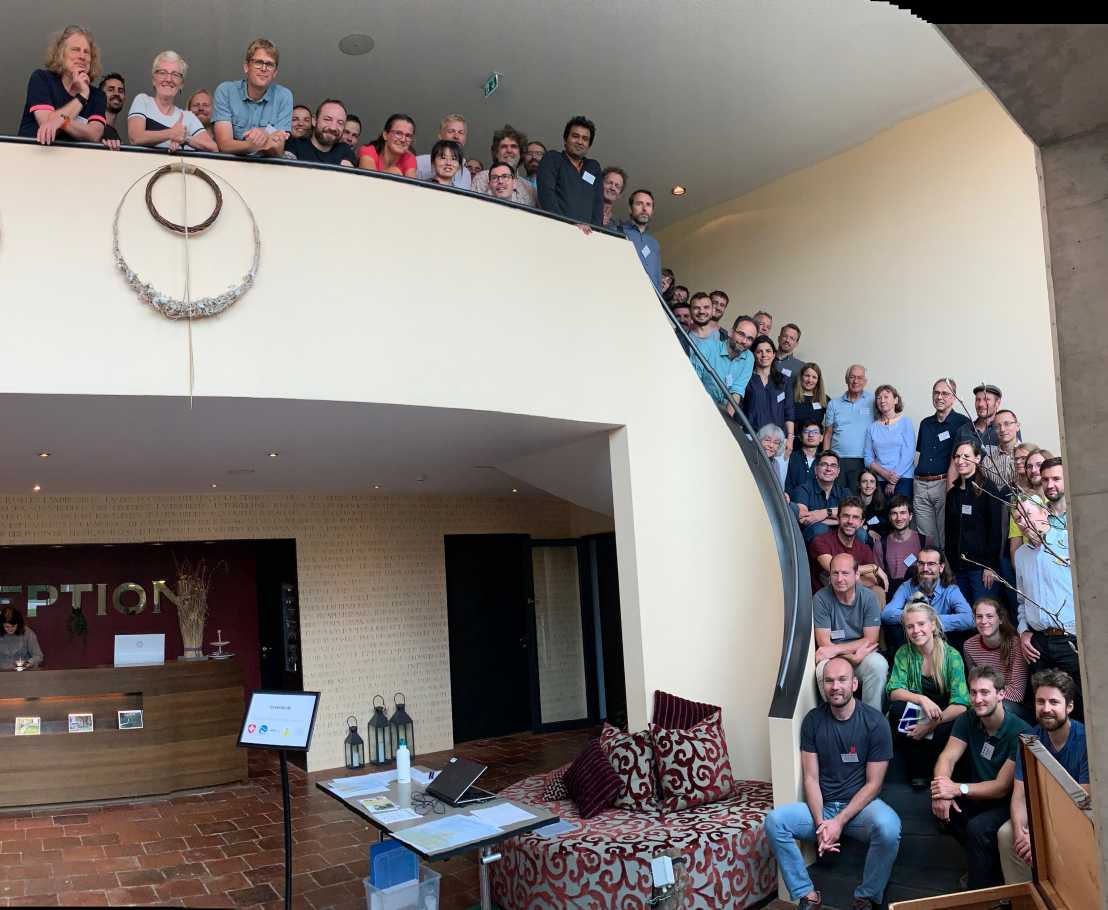
The external page TreeNet 10-year anniversary conference attracted many forest researchers to Bad Bubendorf for two days. A great (although very dense) program addressed the many aspects of observation networks, super-sites, processes, and what to do next. Nina Buchmann gave a talk about "The Swiss FluxNet: a success story with 111 site-years". (27/28 June 2022)
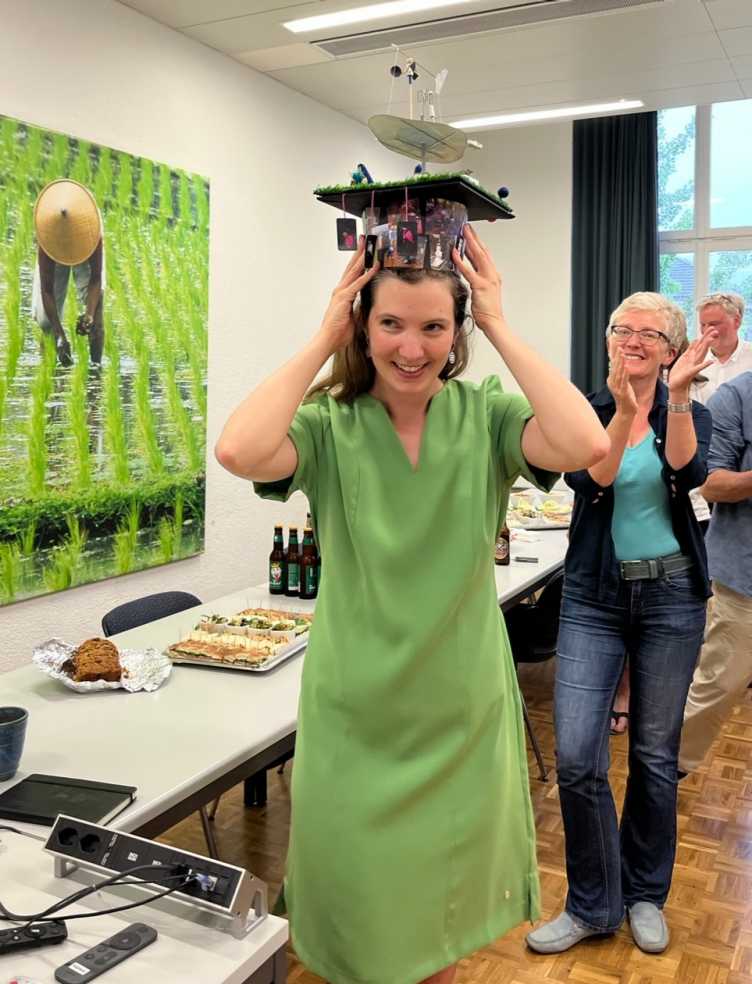
Congrats!!! Iris Feigenwinter defended her doctoral thesis "Greenhouse gas fluxes (CO2, N2O, CH4) from temperate grassland on different spatio-temporal scales: budgets, drivers, processes": 16 years of CO2 fluxes from the Chamau, a comprehensive N2O driver analysis, and the application of nitrogen isotopes to determine the production process of N2O, quite a package! Thanks to external page Prof. Klaus Butterbach-Bahl for coming down from Aarhus as the external reviewer!! (24 June 2022)
The external page Globe Contest came to an end, with the first National Students´ Conference of Globe in Bern. Invited talks in the morning, poster presentation by the students in the afternoon, followed by the award ceremony. Nina Buchmann gave a talk on “Forschung zu Klimawandel, Wiesen und Wälder: Wie, wo, was, warum?", based on the group´s research and our activities within LERNfeld with Globe. Great questions by the young students, first- to nine-graders across Switzerland. Keep on doing science, we need you!!! (24 June 2022)
As part of the 10+ Anniversary Celebrations of the World Food System Center WFSC, Nina Buchmann and Michael Siegrist were interviewed as the former Chairs of the Center. Read about their reflections on the relevance of the food system research. (23 June 2022)
The external page Bayreuth Biology Lecture 2020 --> 2021 --> 2022! Postponed twice, it finally took place. Nina Buchmann spoke about "Reaktion von Wiesen, Äckern und Wäldern auf Klimawandel und Landnutzung". Despite the nice weather, the lecture hall was well filled, many students being present, lots of questions being asked during the discussion. Thanks for the invitation! (22 June 2022)
And today, our external page RELOAD video Cropping systems under Drought (3:09 min) was released by the WFSC! Qing Sun, Yujie Liu and Emily Oliveira show what they worked on during their doctoral projects, what they found out, and what it all means! (21 June 2022)
A visit to the Environmental Robotics Lab of Stefano Mintchev at WSL, long planned, finally took place. Thanks Stefano and your group for showing us the various robots and drones you have developed! Great to see. And the apéro took place with great weather! (14 June 2022)
Today we gathered in the Reformierte Kirche Mettmenstetten for the farewell service for Werner Eugster. Together with his family, friends and colleagues from across Switzerland and Germany, we said goodbye, silently reflected about his legacy for us personally, listened to the speech of the pastor, talked to each other during an apero, and also planted an Download oak sapling high above the village (PDF, 505 KB). We will never forget him, his personality, his kindness, his knowledge. But also the little things, the special aspects of Werner, from checkered shirts and comics to work-arounds and his impatience about non-working IT solutions ;-). All this, was Werner. All this, we will remember. (8 June 2022)
D-USYS conference in Davos: about 100 members of our department met to exchange insights, results, ideas and plans. Nina Buchmann talked about the group´s activities to bring computational competences into disciplinary courses within the Agricultural Sciences curriculum "Linking research to teaching for the benefit of students, researchers and science". (7 June 2022)
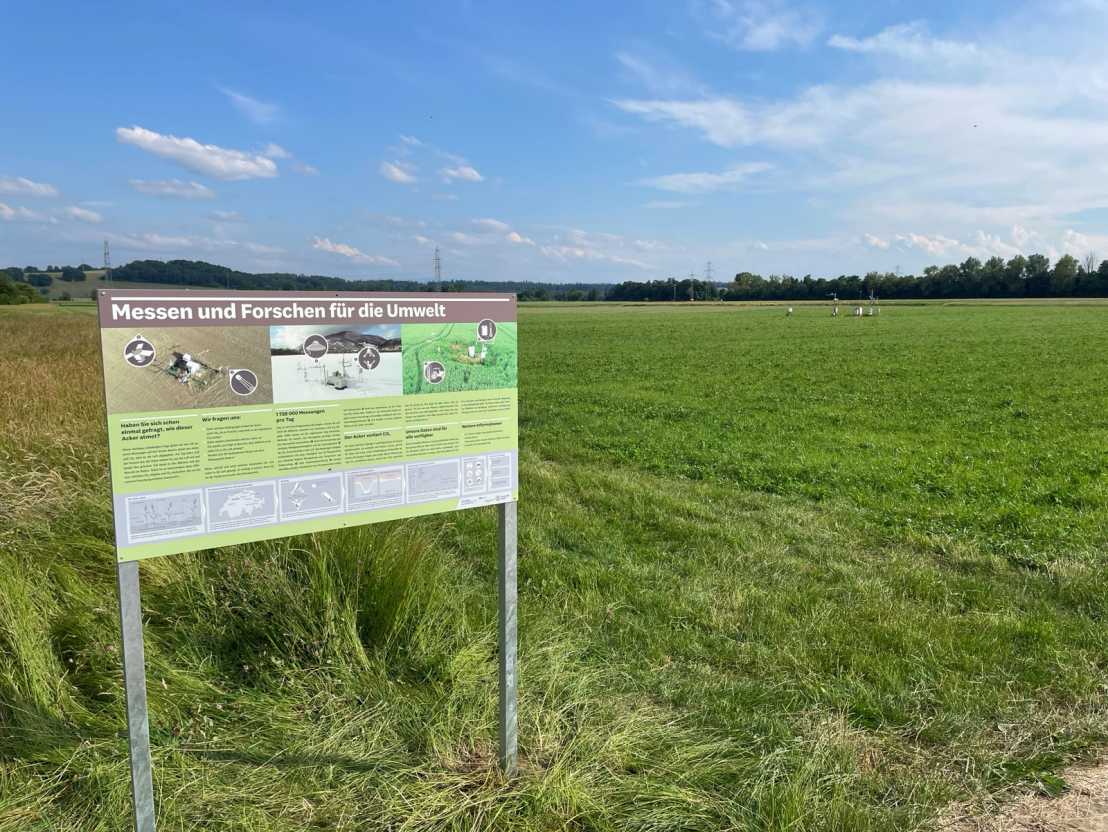
It is done! It took a while, but now, all six info boards are installed! Thanks to all involved! (4 June 2022)
Steppe in Switzerland? Yes, that exists. Anna K. Gilgen took a group of Bachelor's students to canton Valais to see the dry grasslands and the century-old traditional irrigation channels around Naters. On the one-day excursion, the students learned about the trade-offs between landscape and biodiversity conservation and economically viable agriculture. A big thank you to external page André Summermatter and external page Steffen Boch who shared their knowledge on local (agri-)culture and plant ecology. (3 June 2022)
25th Anniversary of the external page Max-Planck-Institute for Biogeochemistry. This meant several days of top science, but also meeting old colleagues and friends. Nina Buchmann gave a external page talk on "Greenhouse gas exchange of agroecosystems: fluxes, budgets and surprises". (2 June 2022)
May
How many earthworms can be found in different soils? What do earthworms have to do with nutrient cycling and climate change? The outreach project LERNfeld teaches exactly this knowledge (and much more) through interactive learning activities for schools. Pupils are always engaged in the hands-on activites and enjoy learning new things. Read the external page testimonial of Juliette, an intern at external page GLOBE (in German). (29 July 2022)
Our colleague, friend, and supervisor Werner Eugster died on Monday, 23 May 2022, at home, without pains, with his wife being with him. He was fighting against the cancer for long, but in the end, he lost. We will miss him, for as many reasons as there are eddies and fog droplets. He will leave a legacy, we will never forget. Thanks again to those who wrote in the small booklet I was able to give him last Wednesday in person. He smiled and showed a “thumb up”. He died knowing how much we valued him. He knew about our thoughts, about his personal and scientific legacy. I am very proud about what I read in this little booklet, having been a colleague of Werner for long. The many condolences pouring in from all over the world support my feeling. (23 May 2022)
Grassland Sciences overseas: The sabbatical of our technician Philip Meier is slowly coming to an end. Before he returns to Switzerland, he worked at the external page US-PWW Site with his Hawaiian colleagues. This site is characterized by lava tubes. external page Lava tubes are geological features, created by lava flows. Whereas the surface of the lava is cooled and solidifies, the molten lava continues to flow underground. When the lava flow ceases, the tube is often emptied out, leaving a cave. Possibly, the crust collapses later, creating skylights and openings to the lava tube. On Hawai'i, numerous lava tubes exist, some of which have openings, providing unique habitats for fauna and flora.
With the help of Ryan Perroy and Jonathan Price from UH Hilo, Philip and colleagues have placed climate stations in and around such a lava tube in the Pu'uwa'awa'a Experimental Forest Unit (US-PWW) on Hawai'i Island in order to assess the micrometeorology of such a lava tube opening. Have a look at this amazing habitat below. (21 May 2022)
The six institutions of the ETH Domain presented themselves to Swiss stakeholders at the World Economic Forum in Davos. The Agricultural Sciences had the honor to represent ETH Zurich. Nina Buchmann represented the Grassland Sciences group and put Swiss FluxNet into the spotlight. A mobile eddy covariance tower was at display - set up specifically for the event. Among the attendants were Federal Councillor Guy Parmelin and the President of the Council of States Thomas Hefti. Federal Councillor Parmelin was enthusiastic about the research presented at the event as he wrote on external page Twitter. Check out further communication of the D-USYS. (23 May 2022)
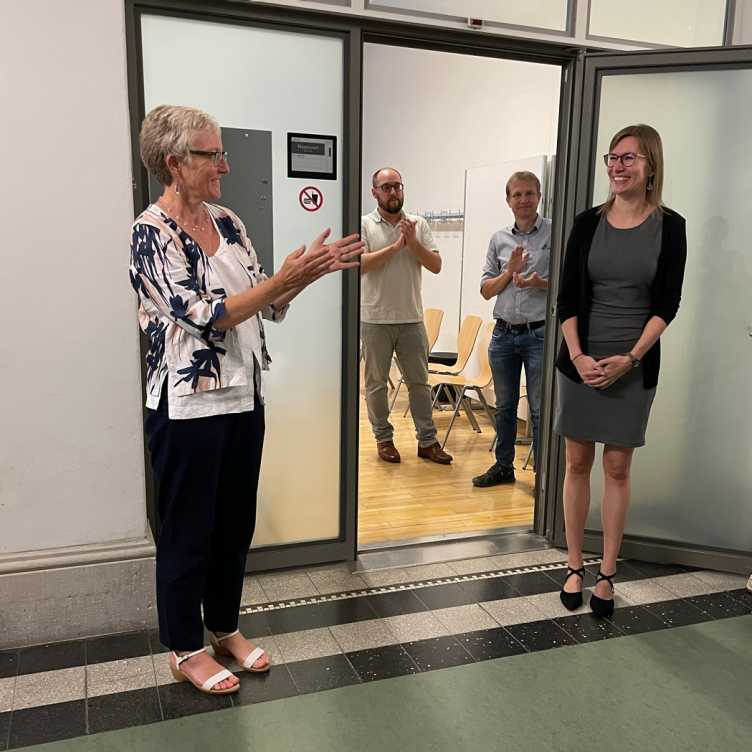
Congratulations to Regine Maier: She successfully defended her thesis "Biosphere-atmosphere exchange of CO2, N2O and CH4 from croplands" within the project InnoFarm with great results! (18 May 2022)
Welcome to Fabio Turco! He started today his doctoral project within DONA. We wish lots of success!! (16 May 2022)
You know "cyanotypes"? If not, then check out the exhibit Blue Links of the Graphische Sammlung of ETH Zurich. Nina Buchmann was invited to write a "text intervention" on two of the works of external page Daniela Keiser. And all contributors were invited to a private vernissage. (13 May 2022)
At the Master's celebration of the Agricultural and Food Sciences, our former doctoral student Sergei Schaub received the Hans Vontobel Prize for the best doctoral thesis in Agricultural Sciences. Sergei finished his thesis entitled "Economic perspective on grasslands, biodiversity and weather extremes" in the DiversGrass project last year. Sergei is the second member of the Grassland Sciences group to receive the prestigious Vontobel Prize after Dörte Bachmann in 2015. Congratulations, Sergei! (6 May 2022)
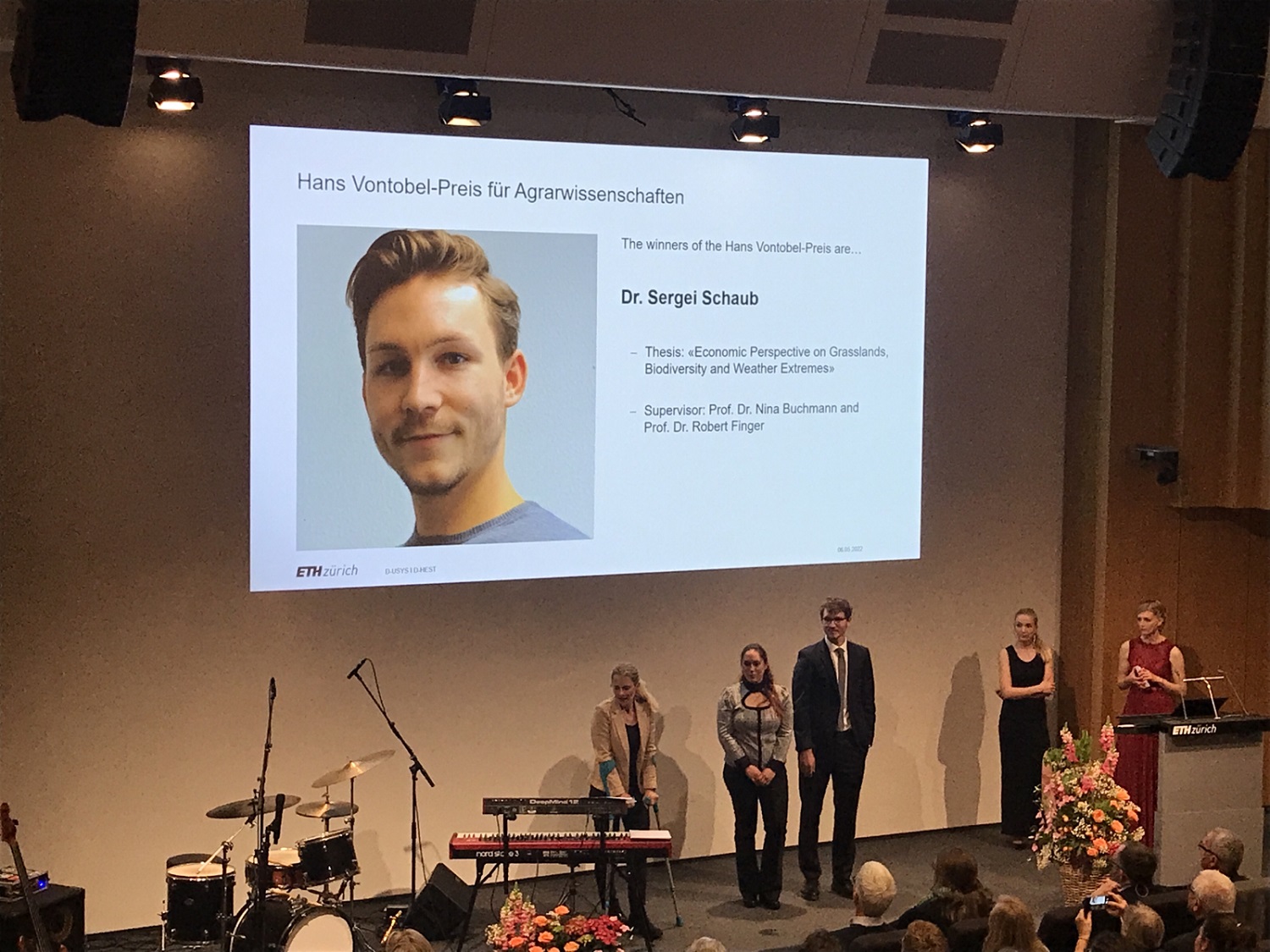
April
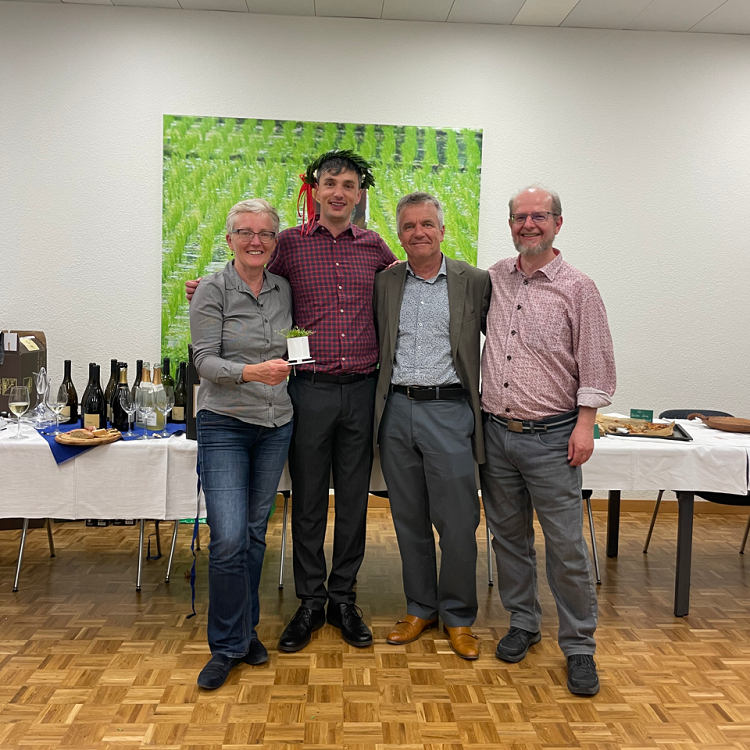
Congratulations to Andreas Riedl who successfully defended his thesis "Quantification of dew and fog water inputs to temperate grasslands". Well done!!! At what a great apero. ;-) Now both doctoral theses of the project IFDewS are finished. (29 April 2022)
A talk about "nitrogen" within 20 min ... not an easy task given to Nina Buchmann for a keynote within a webinar on „The Nitrogen Element – Sustainable Food Production?” organized by the external page European Chemical Society. In the end, the talk was titled "The nitrogen cycle of terrestrial ecosystems & planetary boundaries” and did the job. ;-) (26 April 2022)

25 years of CO2 flux measurements at Davos - reason enough for a short film portrait of our ICOS Class 1 station. Have a look at the freshly released external page film portrait starring Philip Meier and Mana Gharun and read the accompanying interview with Mana! (21 April 2022)
In the latest session of Refresh Teaching, the ETH-wide lunchtime update on teaching skills and methods, Valentin Klaus shared his "learning assessment by student peer-review", which he developed for his ETH teaching. A recording of his presentation, and those of all other presenters, can be viewed at the all-new RefreshTeaching website. Be refreshed! (12.04.2022)
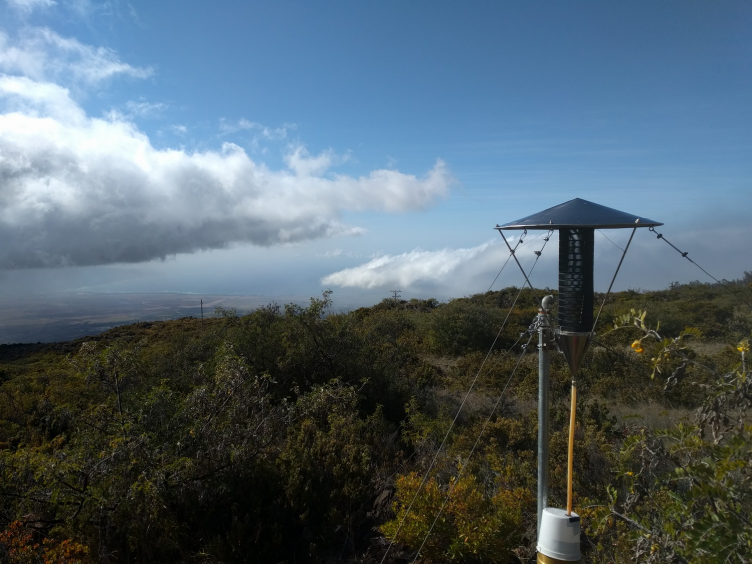
Philip Meier, one of our technicians, is currently visiting the external page Ecohydrology Lab at the University of Hawai'i at Manoa in Honolulu. Thomas Giambelluca's group is running a variety of meteorological and climate stations across different islands of the Hawai'i archipelago.
Philip joined the field station visit and maintenance at the Pauoa Flats above the city of Honolulu with Thomas Giambelluca and Liat Portner. Liat is investigating tree's transpiration in different stands of forests, studying if invaded strawberry guava forests use more water than native ohi'a stands.
Philip also supported Thomas Giambelluca, Henry Diaz, and Chris Shuler with maintenance of external page HaleNet climate stations on the slopes of the Haleakala Volcano on Maui. Rainfall gradients on the Haleakala are enormous, ranging from more than 10'000 mm yr-1 to less than 500 mm yr-1 within less than 20 km. This is due to the position of the volcano in the Pacific, experiencing the tropical trade winds whilst reaching above the trade wind inversion. (8 April 2022)
Within the 3-day visit for the (successful) defense of Kukka-Maaria Kohonen, Nina Buchmann, her opponent, was invited to give a talk to the University of Helsinki faculty. Her topic was "Response of forests and agroecosystems to environmental change: insights from the Swiss FluxNet". (7 April 2022)
Welcome to Jim Ehleringer, Yi Wang as well as Davide Adreatta! Two guests and one new doctoral student starting today in our group. external page Jim will spend his sabbatical from University of Utah between April and July 2022 with us. external page Davide Adreatta is an exchange PhD student from University of Padua and will work with us for two months on temporal niche complementarity. Yi Wang came from Duke University and started as a doctoral student within the InsuranceGrass project. (1 April 2022)
March
"Essen, ohne der Welt zu schaden" ("Eating without damaging the world"), was the topic of this spring´s Treffpunkt Science City. Part of this program was a podium discussion, in which Nina Buchmann participated. Here, the external page recording, but take time, get something to enjoy: it takes 1:40 min ;-) (17 March 2022)
Great honor for Nina Buchmann: The University of Utah School of Biological Sciences (SBS) named her a external page Distinguished Alumna. Nina spent her postdoc at University of Utah in the lab of external page Jim Ehleringer in the 90ies working on stable isotopes. The SBS has now recognized her achievements with the Distinguished Alumni Award 2022. (15 March 2022)
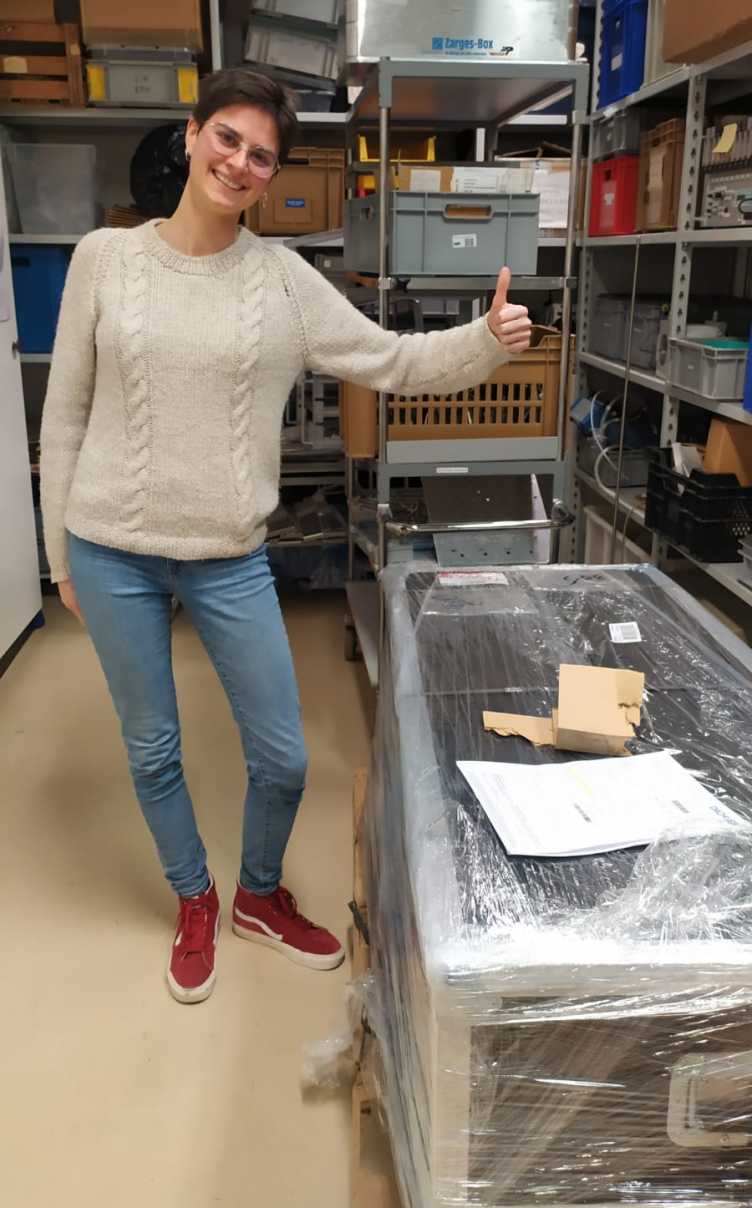
It is finally here! Today - 15 months after placing the order - we received our new COS analyzer. Doctoral student Liliana Scapucci has been eagerly awaiting the device for measurements in the COCO project. She is excited to start field measurements soon. (9 March 2022)
The new infoboard at Lägeren is installed. The illustrative board informs passers-by about the research our group and our partners have been doing at this forest site since 2004, explains the basics of eddy covariance, and displays some of our research findings. (3 March 2022)
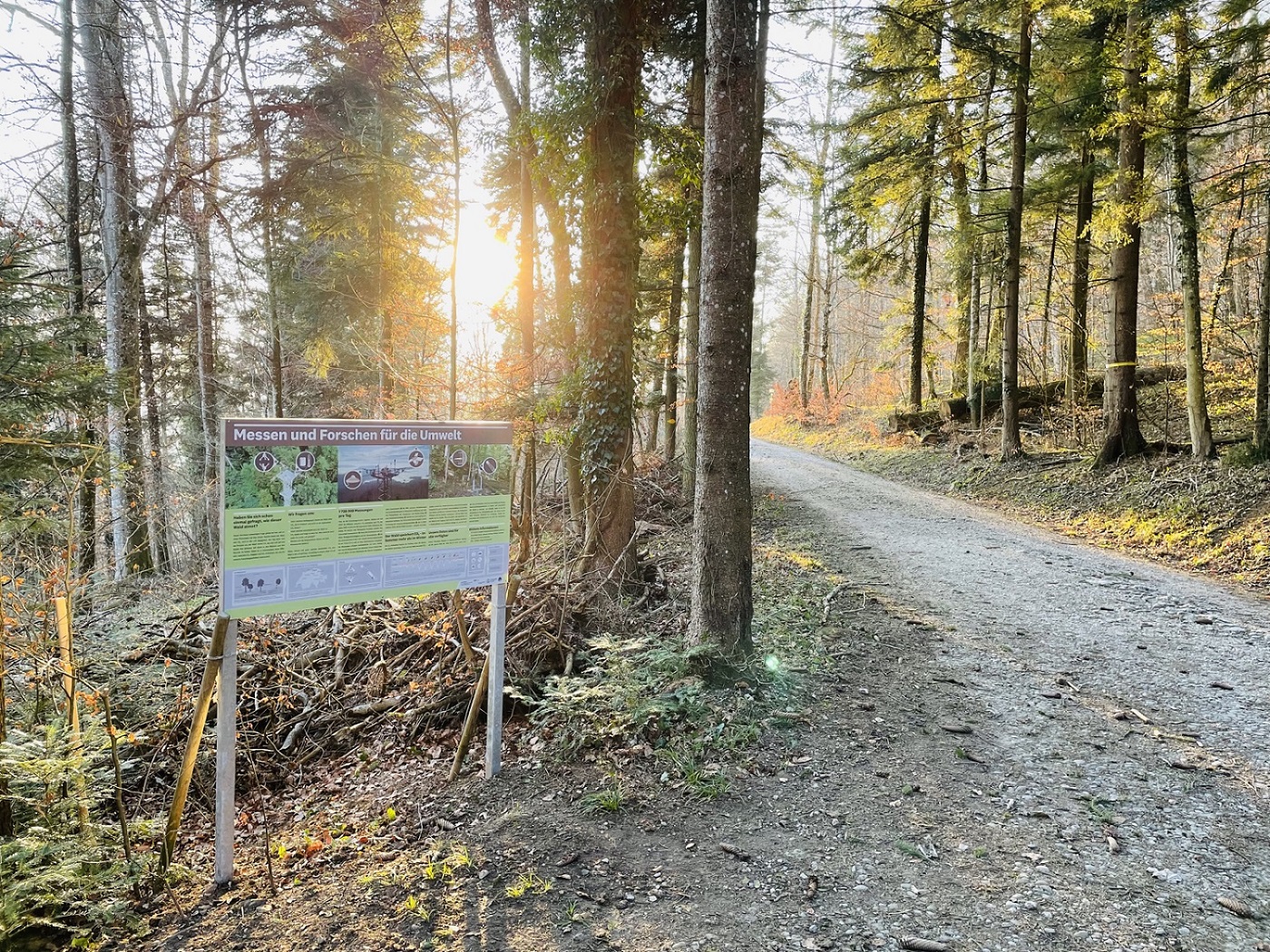
In German, we have this saying "Mit einem lachenden und einem weinenden Auge". This is how we felt when we saw the photo of today, Dr. Mana Gharun, a member of our team over the last 4.5 years, becoming an external page Assistant/Junior Professor at University of Münster, Germany. Dear Prof. Dr. Gharun, we wish you all the best for this next step of your career!!! (1 March 2022)
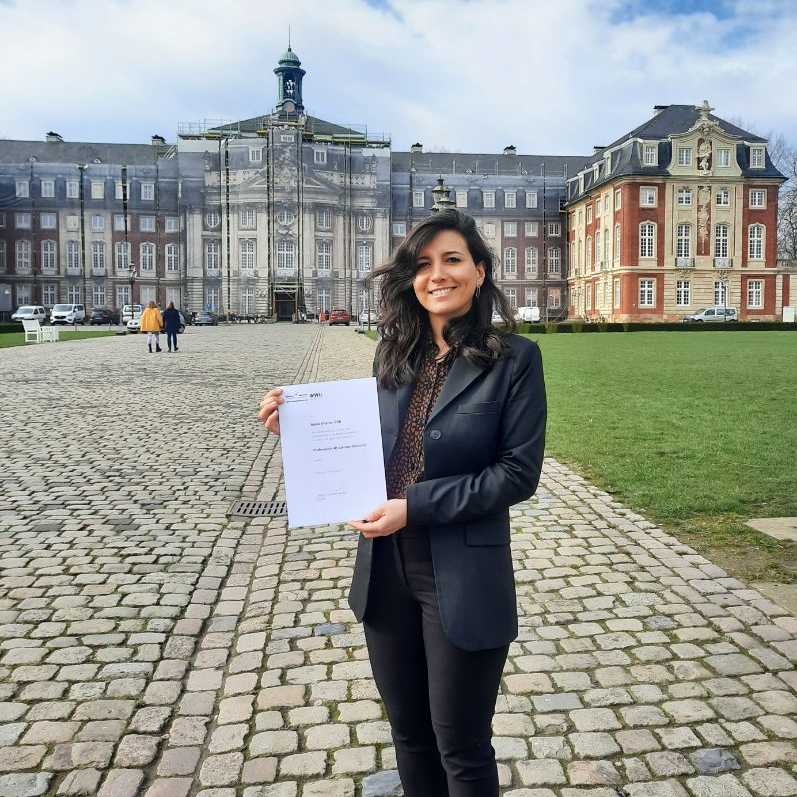
February
In a collaboration with external page Rolf Kipfer from Eawag, MSc student Capucine Marion and Mana Gharun used self-made probes to continuously measure flow of noble gases (He, Ar) inside trees. The experiment in our climate chambers has now come to an end. It is time to pack up and do some writing! (15 February 2022)
Data from our six eddy covariance stations - three grasslands (Alp Weissenstein, Chamau, Früebüel), two forests (Davos, Lägeren), and one cropland (Oensingen) - have just been published as part of the big Warm Winter 2020 collection. The six Swiss FluxNet sites are part of 73 stations providing eddy covariance datasets covering the period from 1989-2020. The collection was originally designed to analyse the warm winter 2019/2020 but has now evolved into a much more extensive dataset. The Warm Winter 2020 ecosystem eddy covariance flux product collection is openly available under the external page CC-BY 4.0 licence. Learn more and check out the dataset on the external page ICOS Carbon Portal. (8 February 2022)
January
During the Specialized Lab Module on Plant and Ecosystem Physiology, Bachelor's students of Agricultural Sciences learn how to measure plants and ecosystem responses to climate. This year again, the course was a mixture of lectures and hands-on exercises. The students worked with a wide range of equipment and devices, identified climatic variables important to assess plant performance, collected data in the field, and compared different plant life forms. (24-27 January 2022)
Our Annual Academic Achievements report 2021 has been submitted. Here some impressive numbers:
- 603 students taught in 2021,
- 549 grades given in 2021,
- 3 Bachelor's and Master's students finished in 2021,
- 13 active doctoral students (by the end of the year),
- 4 doctoral students finished in 2021,
- a large number of publications ... 61 !!! Out of the 55 journal articles, almost half (24 papers) have been written in large consortia.
- 70% of these papers have been published in open access journals (Gold OA) or are open access (Hybrid OA). To increase the open access, we also uploaded postprints to the ETH Research Collection (Green OA). The result: 93% of our publications from 2021 are openly available to everybody! This is clearly the record so far!!!
Thanks to a great team!! (22 January 2022)
Within the Stakeholder Seminar Series of external page SUPER-G, Nina Buchmann moderated a webinar on "Improving permanent grasslands for ecosystem services and biodiversity". Valentin Klaus was one of the four speakers. More than 70 persons attended. More to come later this month. (17 January 2022)
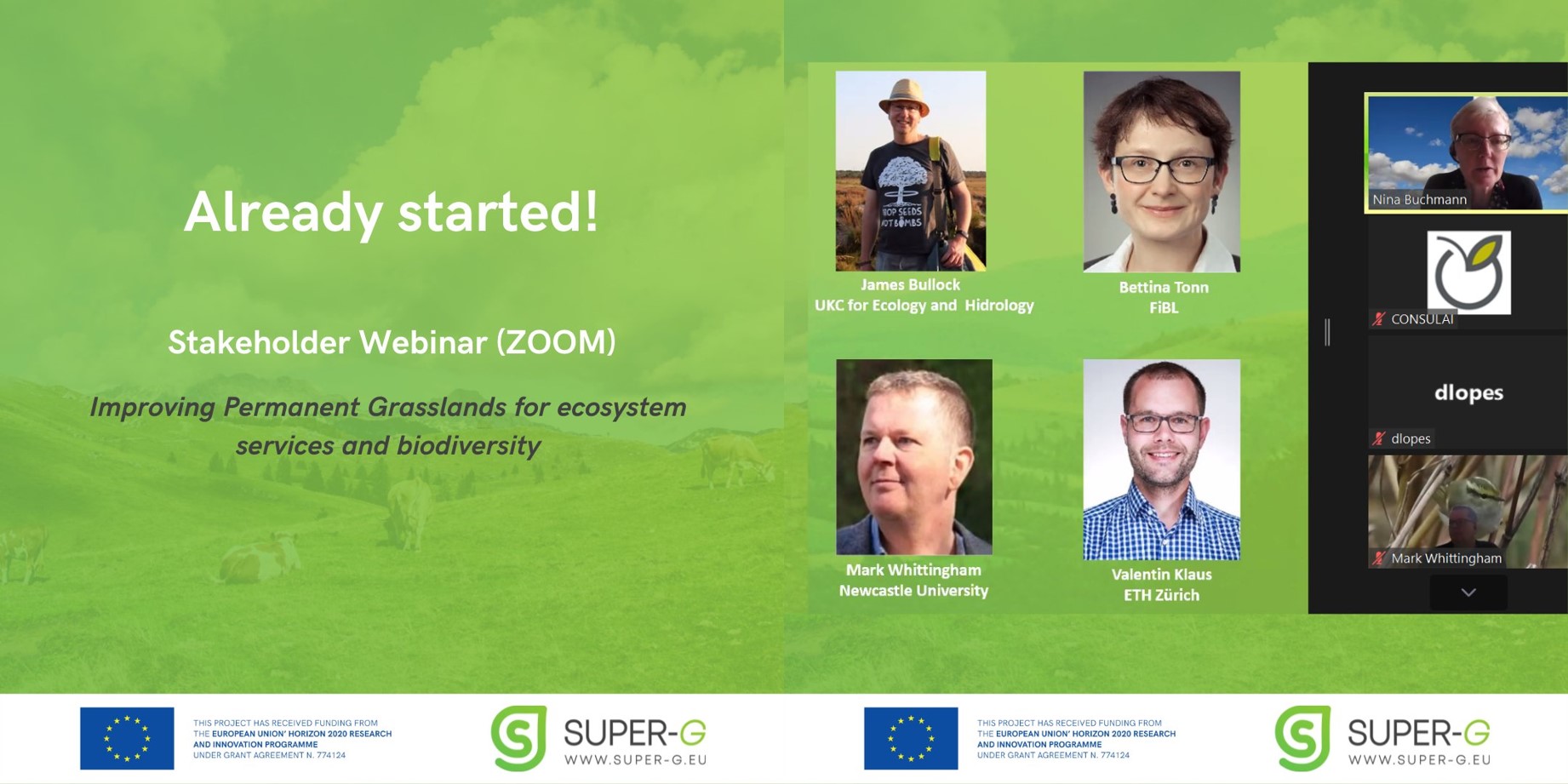
The huge undersea eruption of Tonga's HungaTonga-Hunga Ha'apai volcano sent shockwaves around the globe. These shockwaves can also be seen in our Swiss FluxNet measurements, namely in the measurements of ambient air pressure. Our data scientist Lukas Hörtnagl compiled the high-resolution ambient air pressure data for four of our sites. The impact of the eruption can be seen very clearly. The large eruption started on 15 January 2022 at 5:15 CET and arrived at the first site (CH-LAE) at 21:26, which translates to a travel time of 16 hours and 11 minutes. A bit later the shockwave was also recorded at our other sites (CH-CHA@21:27, CH-OE2@21:28, CH-DAV@21:29). A second hit approx. 5 hours later marks the wave that travelled around the globe in the other direction. (15 January 2022)
Happy New Year! The Grassland Sciences group wishes you the very best for 2022! We are excited to continue our current projects and to start new research, to keep interacting with curious students, and to have more opportunities to exchange with the interested public again. Find out what we did last year in our news archive. We are looking forward to a year full of fascinating findings and interactions. (1 January 2022)
